#jeweled girdle
Photo
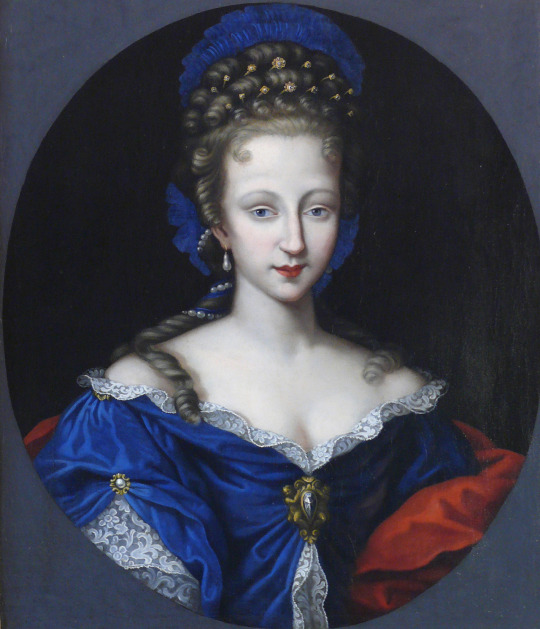

Some 1690s (from top to bottom) -
ca. 1690 Beatrice Violante of Bavaria, Grand Princess of Tuscany by Bartolomeo Mancini (Museo Civico Pinacoteca Crociani - Montepulciano, Sienna, Toscana, Italy). From tumblr.com/roehenstart 1280X1492 @72 685kj.
ca. 1693 Comtesse de Balleroy by Nicolas de Largilliere (Aguttes - 6Dec22 auction Lot 48). From their Web site 2224X2798 @144 6Mp.
#1690s fashion#late Baroque fashion#late Louis XIV fashion#Beatrice Violante of Bavaria#Bartolomeo Mancini#curly hair#hair jewelry#cap#off shoulder V décolletage#lace modesty piece#notched over-sleeves#lace cuffs#Comtesse de Balleroy#Nicolas de Largilliere#wavy hair#cleft coiffure#V décolletage#over-dress#jeweled girdle#V waistline#jeweled clasps
164 notes
·
View notes
Text
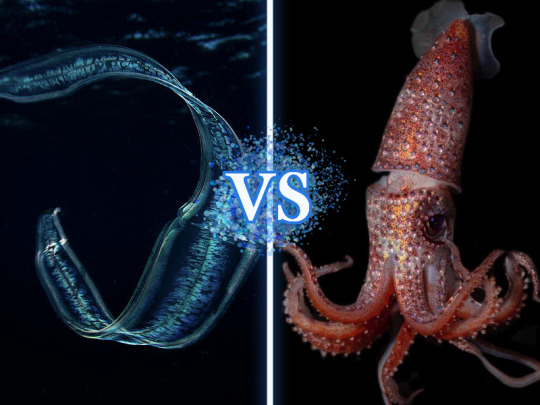
(feel free to correct me if any of the below information is false! I'm just one guy! I won't be able to edit these posts, but a correction is always appreciated anyways)
Venus girdles you NEED to see the way they swim. They're mesmerizing. They're a type of comb jelly that grow up to 3 feet (1 meter) long! They eat small crustaceans!
Strawberry squid, also known as the jewel squid, looks bedazzled with specks of bioluminescent cells all along its body! They're not very large, with the largest mantles only beingabout 11.5 inches (29 centimeters) long! Their bioluminescent cells also can match the color of the water above them, giving them protection from predators underneath them!
#tournament poll#tumblr competition#tumblr showdown#deep sea fish#venus girdle#strawberry squid#jewel squid#fish pictures#deep sea fish tourney
43 notes
·
View notes
Text
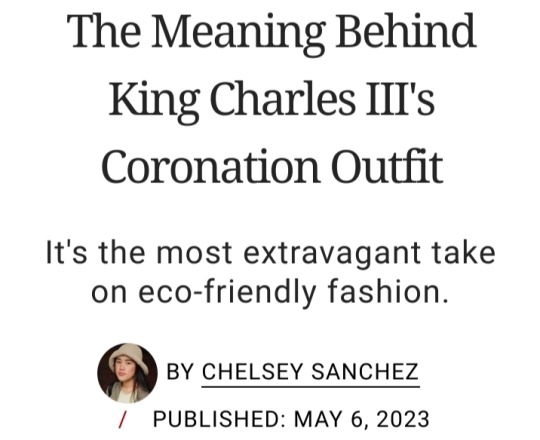
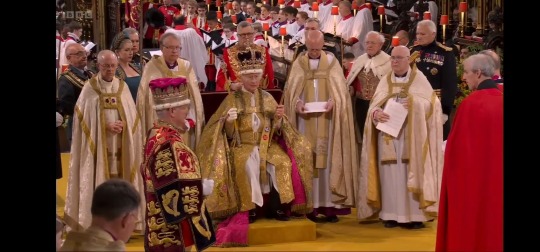
It's no surprise that King Charles III kept sustainability in mind when choosing what to wear on the day of his coronation.
Considering the monarch's lifelong passion for protecting the environment, it's natural that he would choose to make some eco-friendly sartorial choices.
Eco-friendly or not, the king's coronation day look was far from plain.
Upon arrival and departure, Charles wore two different grand robes, per royal tradition.
During the ceremony, King Charles III reused golden vestments, which have been worn for nearly every coronation since 1821, including the Colobium Sindonis, the Supertunica, the Imperial Mantle, the Coronation Sword Belt, and the Coronation Glove.
Buckingham Palace notes that "it is customary for the Supertunica and the Imperial Mantle to be reused, but the reuse of the other objects were made "in the interests of sustainability and efficiency."
Ahead, we break down the different parts of the king's coronation look.
The Robe of State
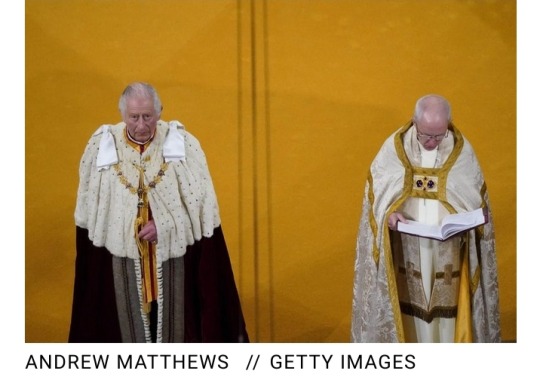
This magnificent crimson velvet robe was originally worn during King George VI's 1937 coronation.
It has since been conserved by the Royal School of Needlework and Ede and Ravenscroft.
The Colobium Sindonis
(Latin for "shroud tunic")
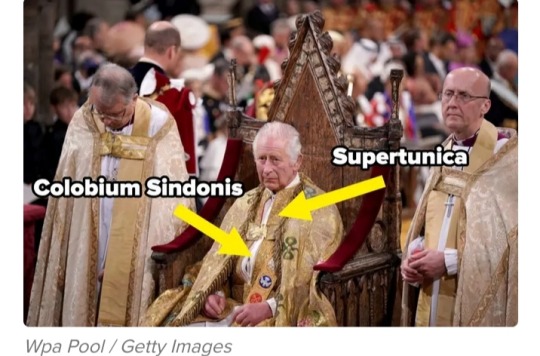
📷: via Buzzfeed
This piece appears as a white linen tunic with a collar fastened with a single button, fashioned after a priest's alb.
This particular piece of clothing has a sentimental meaning to Charles, as it was previously worn by his grandfather, George VI, during his 1937 coronation.
The Supertunica

This sleeved gold coat was originally made in 1911 for George V's coronation.
George VI and Queen Elizabeth II subsequently wore it at their own crowning ceremonies.
Though it is a relatively modern piece compared to other coronation regalia, it is designed in the same style as coats from medieval coronations, which is in turn influenced by priestly and religious vestments.
This Supertunica features goldwork techniques and embroidery, which was originally completed in 1911 by the Ladies Work Society.
The Imperial Mantle
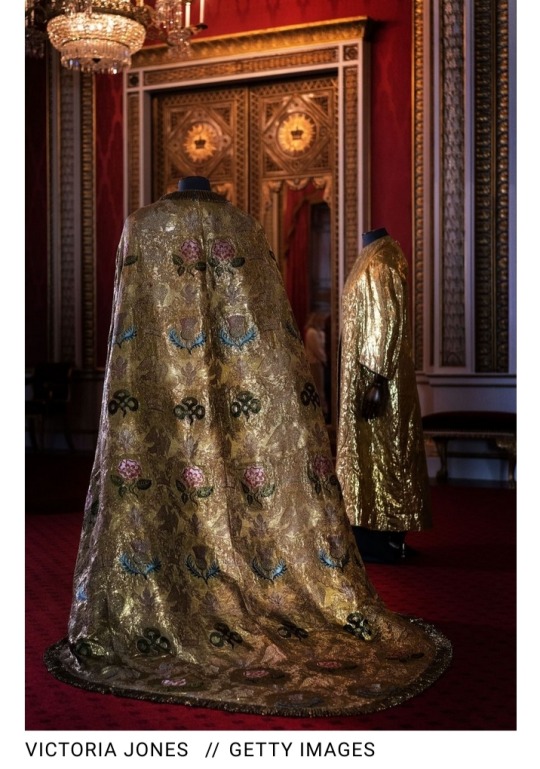
Worn over the Supertunica, the Imperial Mantle appears like a robe.
It's composed of cloth of gold, gold, silver and silk thread, silk, gold bullion fringe, and a gold clasp.
Additionally, symbolic shapes cover the surface of the Imperial Mantle, including roses, thistles, shamrocks, crowns, eagles, and fleurs-de-lis.
This piece was originally created for George IV's 1821 coronation.
It is the oldest amongst the coronation vestments.
The Coronation Sword Belt
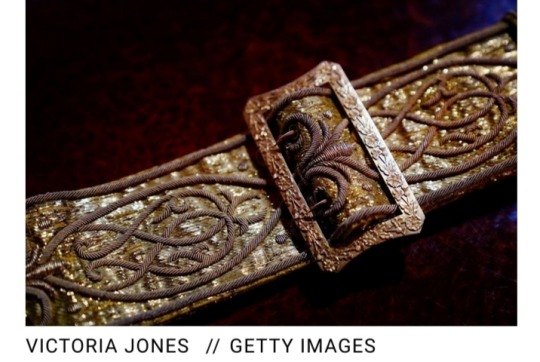
Also known as the Girdle, the Coronation Sword Belt wraps around the Supertunica, with the Jewelled Sword of Offering then fastened at the monarch's waist.
Traditionally, this piece is made anew for each coronation, but Charles has instead chosen to reuse the same Sword Belt that his grandfather, George VI, wore during his 1937 ceremony.
This one features cloth of gold, red silk, and a gold buckle and clip.
The Coronation Glove
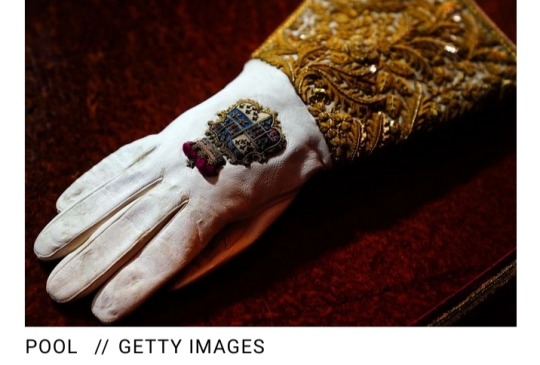
The Coronation Glove, also known as the gauntlet, is worn on the monarch's right hand to hold the Sovereign's Sceptre during the moment he is crowned.
Like the Coronation Sword Belt, Charles chose to reuse the hand piece that his grandfather, George VI, wore during his own coronation in 1937, rather than have one made entirely new.
This piece is made up of white leather and further features gilt metal thread embroidery depicting the national emblems of the Tudor Rose, thistle, shamrock, oak leaves, and acorns.
On the back of the glove's hand, there is an embroidered ducal coronet in red velvet above the coat of arms of the family of the Dukes of Newcastle.
The Robe of Estate
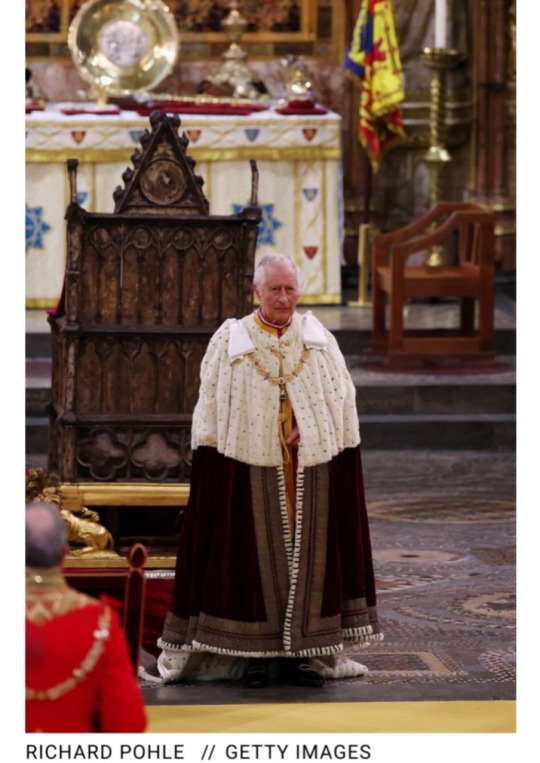
To leave Westminster Abbey, Charles put on this purple silk velvet robe that was, again, once worn by George VI. It includes elegant gold embroidery.
#King Charles III#Coronation Service 2023#Coronation 2023#British Royal Family#Coronation Outfit#The Robe of State#The Colobium Sindonis#The Supertunica#The Imperial Mantle#The Coronation Sword Belt#The Coronation Glove#Girdle#Gauntlet#Jewelled Sword of Offering#Sovereign's Sceptre#Royal School of Needlework#Ede and Ravenscroft#Ladies Work Society#George IV#George V#George VI#Elizabeth II
5 notes
·
View notes
Text
So for basically my whole life I'd grown up with and was resigned to accept that the chinese concept of formal/nice clothing of my and the previous generation has been western clothes. So at any awards ceremonies or performances, entertainers would show up mostly in western suits/dresses and maaaaaybe you'll spot the occasional cheongsam if they're going for a Wong Fei Hong vibe. Which, you know, kinda sucks if you have any concept of western cultural imperialism in asia.
So when the hanfu revivalist movement started, I was waiting to see when it would enter the mainstream -- my hope was for fashion designers to integrate traditional/dynastic elements into their work and make it common place enough that I can buy this shit online for ME. Because I WANT.
Though some of the designs can be a bit hit or miss, I am LOVING what various stars and entertainers are wearing out and about now.
Anyway - here's a collection of Xiao Shunyao's modern hanfu inspired/hybridized stage outfits from the last couple years. For his MLC performances, his stylists seem to be borrowing inspiration from his Di Feisheng and possibly other character costume silhouettes.


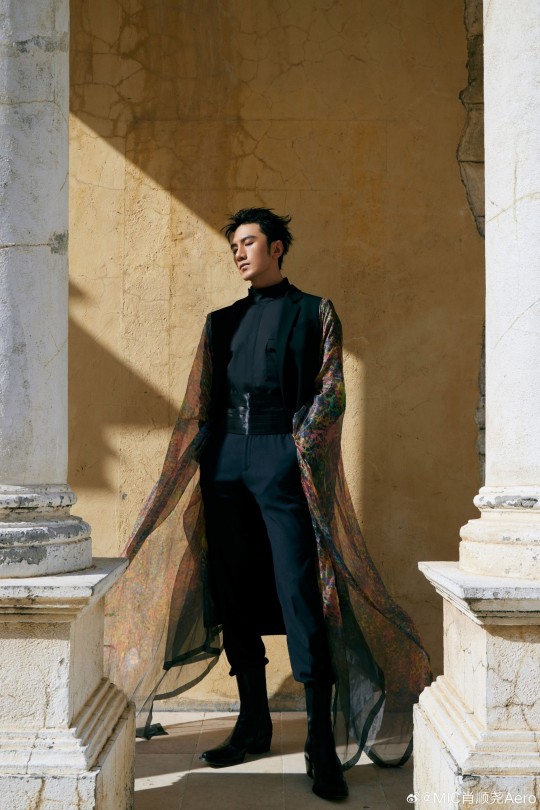
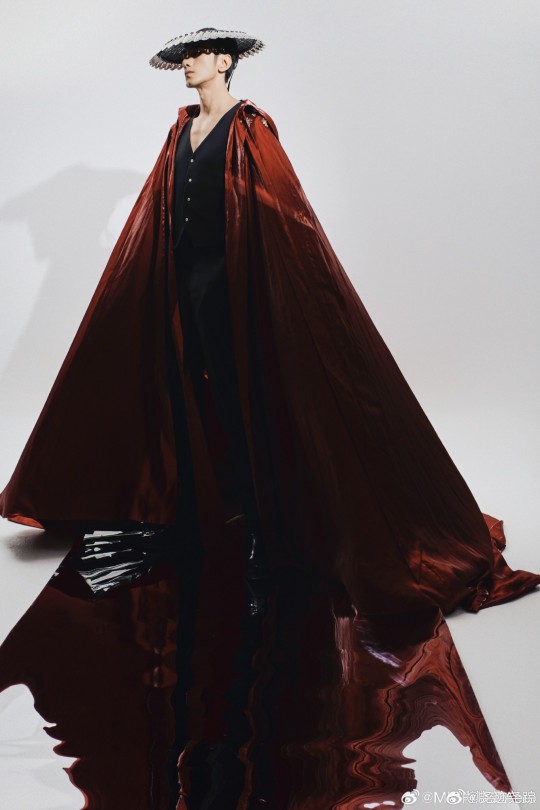
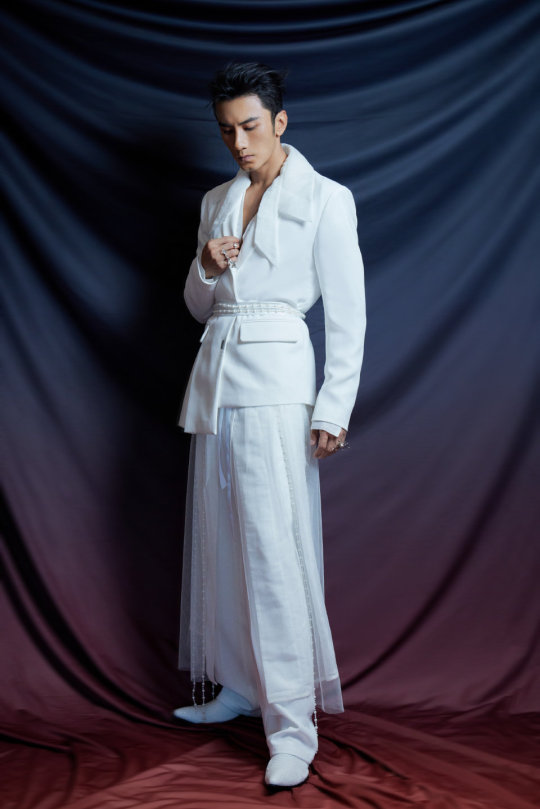
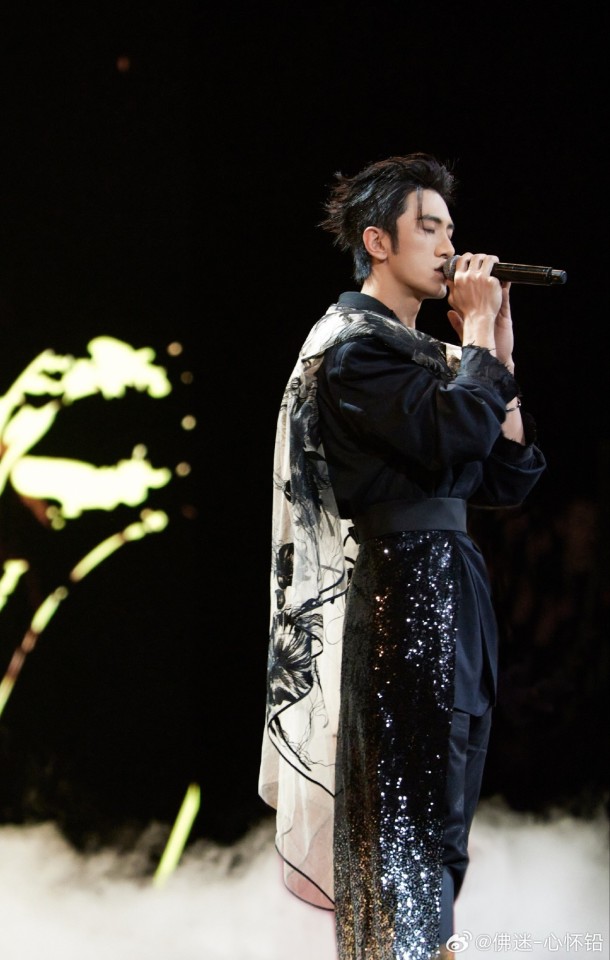
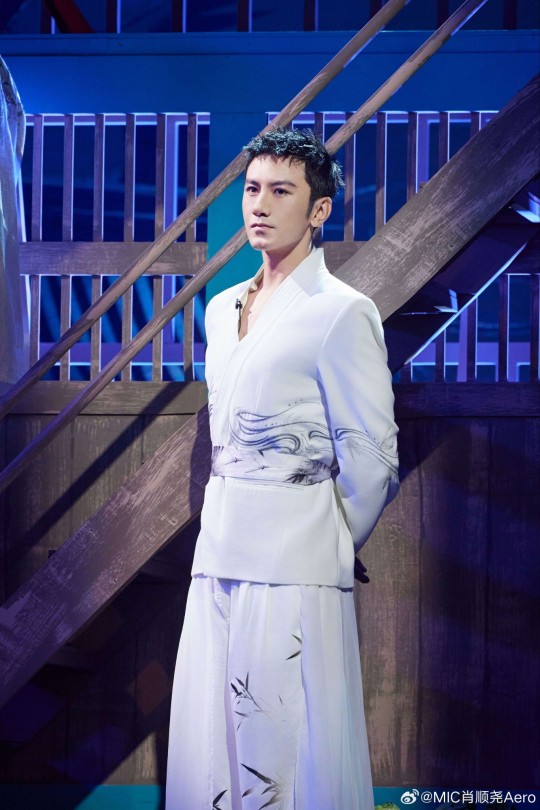
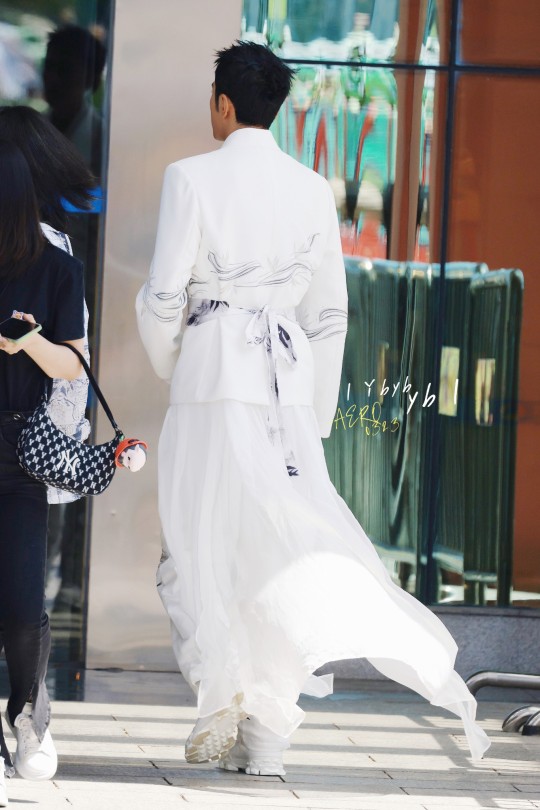


I'd been seeing a few comments about how his outfits play with gender - and some of his outfits do! But I think the interesting thing to discuss is from which standard is he playing with gender? Because from a western perspective, the things he does with his western suit tops, belting on top of the jacket for a tightly cinched waist, and the addition of a trailing skirt = femme. But if you're talking from a hanfu-hybridized pov, that's just a modern take on hanfu and having any of those elements is not inherently femme and would often read masc to me.
So these things aren't necessarily gendered because they exist traditionally in chinese men's clothing or costume designs (ie video games, comics, historical fiction illustrations and film, etc, so therefore in the modern lexicon of masculine/acceptable for men):
presence or lack of a skirt
silky, velvety, gauzy or sparkly material choice, esp in formal or stage clothing
short or long length of skirt
embroidery
flowers/floral/bird designs
folding fans
certain styles of makeup
beading, gold, tassels, jewels
non-chunky jewelry
headbands
widely flowing silhouettes
What XSY's stylists are doing with some western clothing items are interesting. I'm convinced there have been one or two western jacket tops made of thinner material that they're folding over the front, and belting down instead of buttoning (which then matches with his other outfits that are designed specifically to do this). Then they're adding a skirt, cloak or bracer element to it.
The western portions often bring a military minimalist feel which they balance with a more gauzy material in the skirt or cloak portions.
Things I think are playing with gender:
row 1 - image 1: red di feisheng-inspired outfit
The lace-up girdle is there to match the bracers in both material and style. And it's positioned to be similar to the heavy belt that Di Feisheng wears.
HOWEVER. That style of girdle/corset-like clothing item can't be divorced from the modern idea of sexy leather corsets. So imo, this waist piece on that outfit was a choice. Especially when paired with his allergic-to-collars-higher-than-his-sternum necklines. And if you take into context how masculine yet female coded his character is in the drama, the whole look evokes that.
row 2, image 1: black western suit with belt on top, hat, cloak, black boots and not-visible but also a black tassel fringe skirt
Hat and cloak moves the intention of the outfit from western toward a more Asian slant, because alone, it looks like a western black suit with western heeled boots, cinched waist with a lady's belt (seated photoshoot) and western style tassel skirt.
The suit top consists of a vest and a shrug-like sleeve portion that appears masculine at first glance. But take the shrug and pair it with the tassel skirt (I can't find the red carpet photos but here is a better view of the skirt when seated), and I think you got a look that's both intentionally edging toward the femme in a western sense but also confusing matters by hiding within the parameters of both western and chinese traditional male styling.
row 2 - image 2 : white asymetrical western jacket styled in a front fold-over style, gauze skirt, trailing pearl embellishments
The more traditional leaning version of this is the white outfit in row 3 that he wears to the Hi6 Hello Saturday variety show -- the skirt portion on that outfit is one I'd consider non-gendered.
Row 1, images 2 and 3 are examples of masculine/neutral uses of gauze that plays with flow of form but isn't inherently femme.
This stage outfit is very western-appearing masculine suiting, until you hit the skirt which is giving me long ballerina tie-on skirt with the additional swan/mermaid pearl strings. Imo, another example of deliberately using traditional masculine styling but switching it up with the combination of material choice and make that is feminine.
row 2, image 3: black space military boots, black suiting, black -silver ombre sequin trailing skirt and white gauzy shawl with black floral design
The over all design is going for a masculine military-feel. (think this outfit for shen langhun) But instead of a thicker military cloak, it's replaced with a woman's gauze shawl and a skirt that trails behind him very much like the back of a woman's formal fish-tail gown when he moves around.
If you take into context Wang Herun's outfit is a white-silver sequined dress cut in a way to also give a space-military-queen vibe, imo they both coordinated their outfits to balance out with both femme and masc qualities.
Thoughts? I'm curious what others think about this.
While I wait for the CNY photoshoot for XSY's red and black look, here's him with his stage collaborators with a nice range of skirt lengths, period influences and material choices. The woman in the center is the one with the most military-fighter design out of the bunch. The dudes are all in variations of formal-wear-with-good-kicking-boots (and lots of crotch space).
#xiao shunyao#mysterious lotus casebook cast#my royal ramblings#fashion#chinese fashion#gendered fashion in cultural context
1K notes
·
View notes
Text

The embroidered chemise of St. Balthild, an 7th century Anglo-Saxon noblewoman sold into slavery in the house of Frankish king Clovis II, who eventually married her, making her queen of Neustria and Burgundy, and later queen-regent for her three sons. Balthild used her position to abolish Christian slave-trading in her kingdom, as well as buying many slaves to free them.
She established several religious institutions, including the abbeys of Chelles and Corbie, which became renowned as centers of learning in Medieval Europe. She retired to Chelles during the reign of her third son, Theodoric III, and died in 680; she would be canonized some 200 years later.
The chemise may have been embroidered by Balthild herself in her time at the abbey; the designs mimic the jewels she would have worn as queen, but embroidered in silk rather than gold thread, with the garment itself made of plain linen.

During the French Revolution, Chelles Abbey hid its relics in a nearby church, where they weren't discovered until 1983. Among them were Balthild's chemise, along with the remains of the queen herself; her burial garments weren't as well-preserved, but did include a silken girdle woven in striking scarlet and gold.
211 notes
·
View notes
Text

@vastappenen LISTEN okay so this is the full spin-off of the Charlos part of my Prince Lando AU post
I cannot write real fic so this is just like me doing a retelling of what's gone on in my mind lol - and this is the post of Charles in White that's screencapped above
(side note my friend was listening to this haunting music while I wrote this so it might help set the scene - it's called "Fancy on a Bach Air" by Yo-Yo Ma)
this gets a bit NSFW toward the end so fair warning!
ok so to start, this is what was in my original post
Unfortunately the royal courts of Europe were shaken by a quick series of upsets: His Serene Highness Lorenzo of Monaco abdicated the throne in search of a quieter life - his heart had never been in it since his father, the former Sovereign Prince, had become ill and abdicated. This left Lorenzo’s unwed brother Charles to be hastily crowned Prince Regent at the tender age of 22 (too young to be crowned Sovereign Prince bc modern monarchy rules I’m inventing). As a result Charles suffered the loss of his long-time suitor, nobleman Sebastian Vettel, who couldn’t bear the thought of being Sovereign Prince let alone of a land that wasn’t even his own.
Enter the Sainz Vázquez de Castro elders seizing the opportunity and negotiating a deal with Monaco in private conclave with the Papal State (??) to wed their son Carlos to the Prince Regent. Carlos is ashamed at giving in to the temptation… to not just be Prince Consort but to be Sovereign Prince, to rule over the vast wealth of Monaco and by extension the Holy See, to have the coveted beauty Charles in his bed. So he agrees to be spirited away to Monaco and the ugly business of dissolving his betrothal to Lando is left to members of church and state.
But Carlos experiences a complete conversion when Charles is on his knees in the cathedral - looking up at him with docile green eyes as Carlos’ fingertips touch the warm red roses of Charles’ lips as he holds the chalice of holy wine for Charles to drink. Carlos was almost hard beneath the ermine and velvet robes in a house of God when the crown was on his head and Charles next to him - and slightly below - smiling up at him with filaments of gold hanging from pendants on his chaplet, framing his achingly beautiful face. If Carlos feels his immense happiness and prosperity darken whenever he sees Lando’s picture or encounters him at one of the courts then no one need know.
ok so I've removed this from the narrative to of course be charlos true happiness endgame and removed Seb entirely, or he can just be called a close confidante and possible candidate to marry Charles but not very serious.
I imagine young Carlos Jr. moving through the royal courts as a child and teen and seeing the royal children of Monaco sometimes. in my weird version of royalty I have it that Lorenzo is the natural successor to the throne and therefore has always been allowed to dress and be seen "normally". as a second child, Charles was always the rightful property of whichever alliance would maintain Monaco's independence. he was raised mostly in the Prince's Palace and when playing or venturing to where he could be seen he's attended by a retinue of guards each carrying a gonfalon to conceal the young prince from view. on the rare occasions that the prince will be around those not within his immediate family or private staff, he is carefully wrapped in embroidered, jeweled white silks or cottons (depending on the climate) with only his eyes visible. the only color allowed being a scarlet silk girdle around his hips. until he reaches maturity or is married he wears a ferronnière with a single white diamond at his forehead. (I imagine the wrapping as looking like fancy white fireproofs that cover the hands as well and a long, flowy tunic over the top with smart little white renaissance boots (that Charles hates).
Prince Charles is also not permitted to speak outside of his family circle/staff but he is taught multiple languages and fond rumors spread that the prince has a charming lilting accent that comes from a little of everywhere. he is also taught the piano and there is a place on the shore that only locals know of where fairy echoes of his playing can be heard. they call it his 'lone voice' because the mood inside the palace can be judged by the prince's choice of music. childish and jolly for a while, then more challenging pieces, until his eighteenth birthday and an unknown dirge for his godfather who had perished during a racing tourney that summer. the prince's music would change over the years but it would never be joyful again.
I imagine many instances over the years of Carlos Jr. being coaxed by a conniving Carlos Sr. into bowing low to the small, mummified-looking creature that everyone assures him is a prince. the eyes and vague suggestion of white-clad hands and feet are the only indications that this is true, but the big green eyes are very expressive and seem to smile whenever they meet Carlos' own big brown eyes. Prince Lorenzo has a kind smile and would be a good playmate but solemnly maintains his position by his parents' side. Prince Arthur comes along in a bundle of energy and mischief - being blessed with a birthright to total freedom so long as his elder siblings are alive. he enjoys being swung around and thrown in the air by Carlos Jr. which helps pass the tedium of royal engagements. Arthur is clearly the favorite of Charles who rather mothers him - especially when the Sovereign Prince falls ill and hushed preparations are made behind palace walls for Lorenzo to take the throne. Charles is so deep in mourning for his godfather and soon his own father that his presentation at court is delayed indefinitely as it would be cruel to open him up to marriage bids that would inevitably take him from his home.
in the meantime, Carlos Jr. has grown into his large features and promises to inherit all his father's looks and daring. at his father's encouragement - "by the time you wed a virgin, you will need to know everything there is to know about pleasing them" - Carlos enjoys countless conquests across every continent on the globe. he's a seasoned bachelor by the age of 20 and has been given his own estate outside of Madrid to party, race expensive cars and drink expensive wine. but even as he wakes between the thighs of this or that beautiful boy or girl, his mind recalls the hours spent at court in Monaco trying to discern the subtlest lines of Prince Charles' body beneath the absurd layers of drapery. he knows for sure that the prince is slim but not scrawny. that his posture is upright and proud and stands about the same height as Carlos. at times when he scoops Arthur up to hold on one hip, Carlos can discern the fine dip of a small waist - probably small enough for Carlos' big hands to meet around. what a gift-wrapped present for whoever got to marry him!
but by the time they next meet, news has traveled all over of the Sovereign Prince's health and plans for the reluctant Prince Lorenzo to be hastily crowned. during their first visit after this news, Carlos Jr. makes his usual low bow to Prince Charles but when he looks up he sees tears clouding the prince's green eyes. it twists Carlos' heart and he boldly takes the prince's hand and presses a hurried kiss to the silk and at the same time trying to speak with his eyes how sorry he is for the prince. the small noise Charles makes at Carlos' boldness is a precious secret Carlos holds like a tangible thing against the breast of his tailcoat as he hurries down the steps before any of the other royals can notice what he's done.
[this is when the above section from my AU comes in and Carlos is attempted to be married off to Prince Lando, Lorenzo abdicates, Charles can only be named Prince Regent bc of his status etc and a hasty arrangement is made for him to marry Carlos]
at their wedding I imagine Charles' veil/headdress to be much lighter and tied in a simple knot at the base of his head. the only time Charles is called to speak is to swear fealty to the crown, to his country, and to his husband (it's also the first time Charles' voice has been heard by almost everyone in the Cathedral including Carlos. it sounds like joyous music, dipping deep and rich one moment and high and sweet the next - with a little bubble of laughter at the end. Carlos wants to hear him talk forever.) when the priest finishes his blessing, Carlos put a hand beneath Charles' chin and guides him to stand. he moves closer to Charles than he has ever been permitted and circles his arms around his neck to untie the knot. the veil falls away and a collective gasp rises up from the cathedral through the clouds of incense. Carlos doesn't gasp so much as suck in a triumphant breath through his nostrils and lifts his chin in triumph. Charles is not just the chaste ideal of beauty that the court and citizens of Monaco had whispered about for years, he is the vision of temptation itself: a delicate brush-spatter of freckles beneath a flush on finely molded cheekbones, a straight French nose that was the final word on French noses, and perfectly smooth lips in the shape of a patriotic 'M' and the exact red of Monaco's flag. the prince's hair and brows have all the shades of a glossy hazelnut and a thick fan of lashes surrounded the green eyes - all that Carlos had known of him until now. but soon, he would know everything about Charles and in a way no one else ever had or would.
Carlos is supposed to buss a small, ceremonial barely-there kiss to Charles' lips to please the court but of course he can't help himself and, holding Charles' face in his big hands, presses a fiercely possessive (thankfully still close-mouthed) kiss that nearly makes Charles collapse. murmurs go around the cathedral of "well, those Spaniards, you know".
when they are crowned, my version of royalty has the priest setting the heavy gold crown on Carlos' head but Carlos in turn places the chaplet of gold leaves and gemstone pendants on Charles. Carlos is flying as high as mortal can when he can finally lead Charles out to the balcony and show him off to the waiting public. Carlos wonders if there's a man on earth who possesses more wealth than he does at that moment.
but there's one more thing he doesn't yet have! oh you bet the bedding ceremony is weird and fucked up and poor Charles is using the short time they have alone as they move through the halls (merely flanked by guards) to nervously and apologetically explain to Carlos what they will need to do. something about protocol for regents who found it difficult to "perform" under such circumstances etc. Carlos just puts a big warm hand to Charles' lips as they are rushed along, leaning into to whisper that he'd take Charles' virginity in front of his own grandmother if that's what was required and his desire still wouldn't be dampened.
the chamber is small and has one purpose. the clergy stand behind wrought iron mullioned screens but Charles can see their eyes clearly and has known many of them all his life. he'd probably faint dead away from nerves if Carlos didn't pull him close and kiss him so deep and dirty it should've turned Charles' white gown red with lust. Carlos tells him to look only into his eyes, that he'll take good care of him. there's a whole intense sexy element to Carlos unwrapping Charles the rest of the way, just like the birthday present he'd imagined when he was a teenager. he probably spends WAY too much time on foreplay considering the witnesses are only there to see one thing and then leave but Carlos knows that Charles deserves this. by the time they've reached the point where Carlos can reach a hand between them and literally 'come' up with the goods to hold up and be viewed, Charles' moans are reaching up to the rafters. there's a rustle and murmured blessings as the priests finally withdraw.
Carlos is like FINALLY and decides to give Charles every bit of the benefit of his vast experience and looks smug as hell when Charles' attendants have to physically carry Charles to his own bed bc Carlos fucked him senseless lmao
agfalsgfsla this was so weird and detailed and I do not know WHERE it came from but if an actual writer sees this and wants to write it properly PLEASE tag me or message me!!!
EDIT: these are great photo references for adult Charles and Carlos in this AU

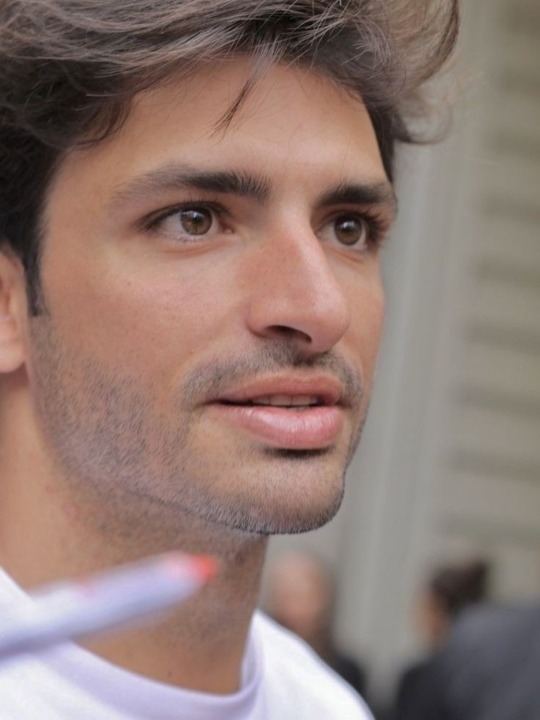
source


#charlos#carlos sainz jr x charles leclerc#mine#I hope you enjoy @vastappen !!#f1 royalty au#prince of monaco
143 notes
·
View notes
Text
In light of recent interesting discourse about Beren and Lúthien's Silmaril theft, and the Fëanorions' priorities in the lead-up to Nirnaeth and after, I started wondering how things might have changed if B&L had managed to steal two Silmarils rather than one. Would pulling the Union together be harder with only one jewel left to draw focus in Angband?
Then as soon as I thought about it some more, I realised the most inevitable path diverged earlier than that.
Then I started writing a fic, got 400 words in, and realised I wanted to actually figure out what happened first. So here's a half (or potentially a smaller fraction) of a sort of bullet point fic/plan/thing, which may or may not get properly written up later. First I need to work out where to go from here.
Angrist was forged by the greatest of the Dwarf-smiths in the master-workshops of Nogrod. It cuts two Silmarils from Morgoth's iron crown before the blade snaps, and Morgoth stirs in his enchanted sleep.
Beren passes one Silmaril to Lúthien, and they run for it.
Carcharoth still meets them, snarling, at the gate. Beren still holds out a Silmaril to ward him off. His hand still gets bitten off.
But when the Eagles come for them, and Lúthien clambers sobbing onto Thorondor's back, she clasps a Silmaril in her hand.
The Eagles bear them towards Doriath, and the Treelight undiminished shines out over Dorthonion and Gondolin.
In chilly Himring, Maglor is shaken awake from nightmares of fire and smoke by his eldest brother, who drags him out of bed and towards the window. "Look! Is that not a Silmaril that shines now in the North?"
Maglor recognises it, of course. Moreover, he recognises the size and shape of Eagles in flight, even at a distance. Recognises, too, that as often as not they bear doom itself upon their great feathered backs.
(His father's jewel stinging his Oath awake, his brother's emaciated bleeding body wrapped in Fingon's cloak - they all mean failure.)
"Thingol's daughter and the mortal must have succeeded," he says. "What can we do?"
Maedhros and Maglor, you see, are Not Happy with the news out of Nargothrond.
That Celegorm wanted to force an elf-maid to wed against her will, after what they heard befell Aredhel—
That Curufin could turn against his favourite cousin, and betray him to his death—
"I am afraid," says Maedhros, "of what it will make us do. What it will make us become."
"We could ignore it," says Maglor, whose first response is always inaction. "Let it go to Doriath—" But it is hard even to finish the sentence, with the Oath choking his words.
And there is a bigger problem: Celegorm and Curufin, who are sleeping now (it is only Maedhros who can be relied upon to pace the fortress by night), will not do so forever. They have already attacked Thingol's daughter once - will they do so again, before she can pass into the safety of her mother's Girdle?
"We have to get to Doriath before they do," says Maedhros, and wonders when his little brothers became the threat to be outpaced.
"And then what?" asks Maglor, who never shies from difficult questions.
Maedhros gives him one of his quick strange smiles. "This is how it works, you know," he says. "Huan has turned from Tyelko. Tyelpë has repudiated Curvo. It turns you into the worst version of yourself, and then it strips away the best thing you have left."
Maedhros has ridden out to claim a Silmaril before, and lost all of himself in the process.
Maglor, too, has been offered all he ever wanted - his dearest brother, returned to him - and turned away for the sake of the Oath he renewed at his father's deathbed.
They are both afraid of what they could become.
They ride out from Himring anyway, swiftly and secretly, before the dawn.
Meanwhile, Thorondor sets Beren and Lúthien down on Doriath's southern border.
Huan comes to join them, and with the power of the Silmaril, Beren is healed sooner than he might have been, otherwise.
The Quest is fulfilled. Beren has no reason to stay away from Thingol's house.
Instead of wandering in the wilds, the lovers return to Menegroth, present a Silmaril, and promptly get married.
Thingol is very surprised (and overjoyed) to see them; the last news he had of Lúthien was that she had vanished from Nargothrond.
In fact, he's just sent out a couple of messengers, led by Mablung Heavy-hand, with a scathing letter to Maedhros Fëanorion demanding his aid in finding the princess.
North of the Girdle: "Hey, isn't that Maedhros Fëanorion?"
"Sure is," says Mablung, who was at the Mereth Aderthad.
"Hail, Mablung of Doriath!" calls Maedhros, who never forgets a face. "What news from King Thingol?"
Well, there isn't news as such. Just... fury.
Maedhros considers the merits of keeping his cards close to his chest versus the dire diplomatic situation he's currently in, and opts to share what they saw from Himring, and what it bodes for Beren's success.
He decides not to share that Lúthien was definitely with Beren, which he knows because his brothers attacked her.
Maglor is not sure how stopping to chat with an Iathren marchwarden is going to get them closer to a Silmaril, but he isn't in the habit of arguing with Maedhros.
Anyway, before the conversation can wrap up, a marauding werewolf appears.
Right. Carcharoth.
The Iathrim make the sensible call and scramble up some trees. Maglor follows a beat later.
Noldor don't climb trees very often. It isn't one of the skills Maedhros has had cause to practice one-handed.
Not that it matters, because he's frozen where he stands, eyes wide and bright and thoughtful.
This is unusual. Maedhros would not be the most renowned warrior of the Noldor if he were constantly dissociating in the midst of battle.
He saves the dissociation for after the battle, thank you.
The wolf is almost upon him.
Well, thinks Maglor, about time I did some saving for a change.
Maglor is not Lúthien. Does he need to be? He knows enough about madness, and enough about torment. He knows how to sing the suffering to sleep.
He drops down from his perch to begin a lullaby.
Carcharoth slows down when he sings, and comes to a momentary halt, and Maglor takes the time to hiss, "Nelyo, run—"
"They burned him," Maedhros breathes, still with that bright faraway look in his eyes that means he is half-lost in memory. "His hands were black and ruined. No evil thing may touch them."
The wolf lunges.
[I want to kill Maglor off here but I'm a coward. so.]
Carcharoth savages Maglor's leg and he collapses.
That brings Maedhros back to himself.
Mablung and his party aren't heavily armed. They were only meant to be messengers, after all. They get a few shots in at the wolf, who runs off, still maddened.
Maglor isn't moving isn't talking and there's so much blood—
(to be continued)
#silmarillion#my fic#bullet point fic#beren#luthien#maedhros#maglor#I think I know what happens next#but not what that leads to#I had to look at a map for this do you know how traumatic that was#anyway turns out bullet point fic is quite fun to write#maedhros and maglor have entered leithian and derailed it#maybe fingon will make an appearance too#who knows I'm tired#what even is this actually#cw blood
504 notes
·
View notes
Text
My little quest to find the most iconic dresses for Montgomery's girls.
None of the pictures is mine. They are all from Pinterest. They may be historically inaccurate. They are also not ideal :).
Valancy Stirling:
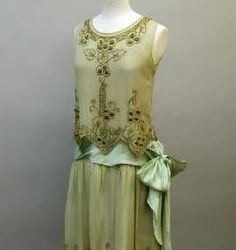
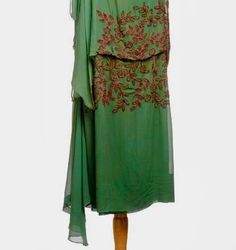
"She got a pretty green crêpe dress with a girdle of crimson beads, at a bargain sale, a pair of silk stockings, to match, and a little crinkled green hat with a crimson rose in it." (The Blue Castle).
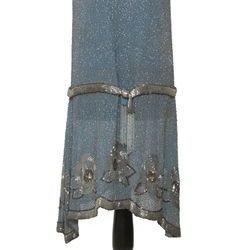
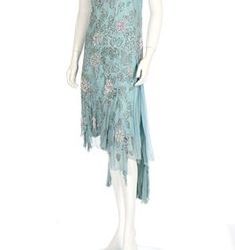
"She had a little smoke-blue chiffon which she always put on when they spent the evening at home—smoke-blue with touches of silver about it." (The Blue Castle).
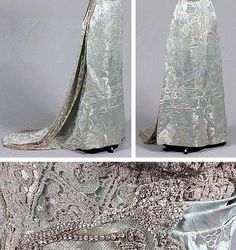
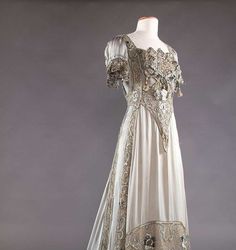
My idea of what Valancy's (borrowed) masquerade dress MIGHT have looked like.
"Once they did go to a masquerade dance in the pavilion at one of the hotels up the lake, and had a glorious evening, but slipped away in their canoe, before unmasking time, back to the Blue Castle." (The Blue Castle).
Emily Byrd Starr
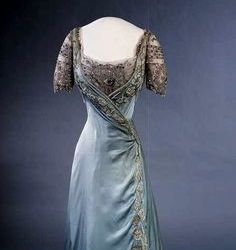
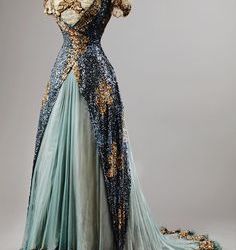
On the left: "It is to be of shot silk, blue in one light, silver in others, like a twilight sky, glimpsed through a frosted window-pane—with a bit of lace-foam here and there, like those little feathers of snow clinging to my window-pane." (Emily Climbs)
On the right: "An arrow of rhinestones in her dark hair—she had hair that wore jewels well—lent the necessary note of brilliance to the new dress of silvery-green lace over a pale-blue slip that became her so well." (Emily's Quest).
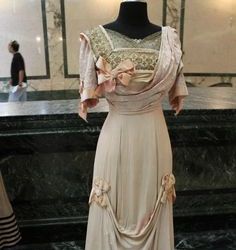
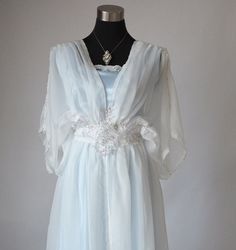
On the left: "it was a pretty crepe thing, of a pinkish-grey—the shade, I think, which was then called ashes-of-roses—and was made collarless—a great concession on Elizabeth's part—with the big puffed sleeves that look very absurd to-day, but which, like every other fashion, were pretty and piquant when worn by the youth and beauty of their time." (Emily Climbs).
On the right: "I want you to wear harebell blue gauze over ivory taffeta for your bridesmaid dress, darling" (Emily's Quest).
Anne Shirley:
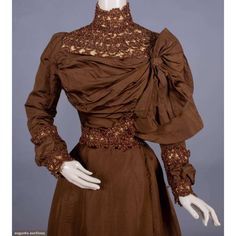
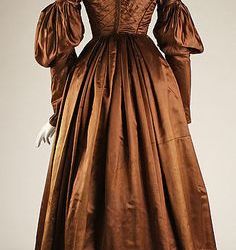
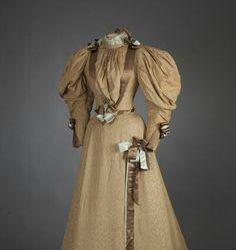
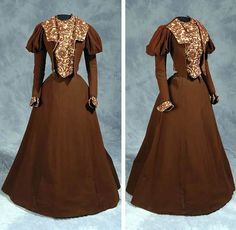
"Oh, how pretty it was—a lovely soft brown gloria with all the gloss of silk; a skirt with dainty frills and shirrings; a waist elaborately pintucked in the most fashionable way, with a little ruffle of filmy lace at the neck. But the sleeves—they were the crowning glory! Long elbow cuffs, and above them two beautiful puffs divided by rows of shirring and bows of brown-silk ribbon." (Anne of Green Gables).
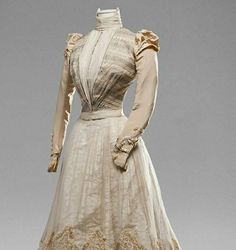
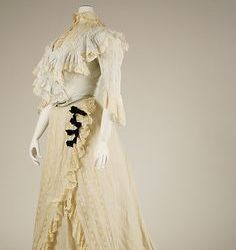
"In her light dress, with her slender delicacy, she made him think of a white iris." (Anne of Island).
Rilla Blythe
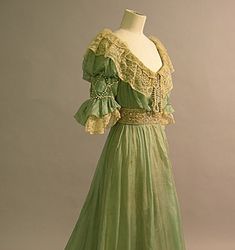
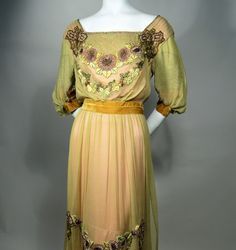
"Miss Oliver, shall I wear my white dress tonight or my new green one? The green one is by far the prettier, of course, but I'm almost afraid to wear it to a shore dance for fear something will happen to it." (Rilla of Ingleside).
Pat Gardiner:
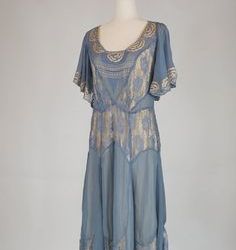
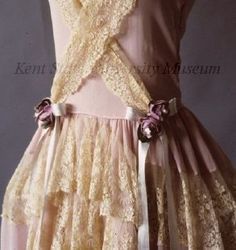
On the right: "Pat slipped into the house and flung a bright-hued scarf over her brown dress with its neck-frill of pleated pink chiffon. She always thought she looked nicer in that dress than any other." (Pat of Silver Bush).
On the left: "Pat had on her blue linen afternoon dress...which, incidentally, was the most becoming thing she owned."(Pat of Silver Bush).
And bonus:
Robin Stuart
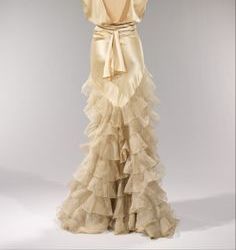
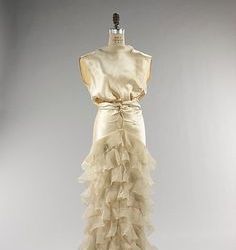
"She wore a dress of pale yellow taffeta, with a great rose of deeper yellow velvet at one of her beautiful shoulders. Jane thought she looked like a lovely golden princess, with the slender flame of the diamond bracelet on the creamy satin of her arm."(Jane of Lantern Hill).
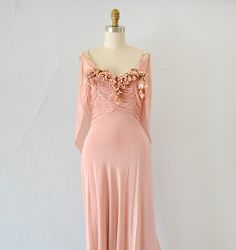
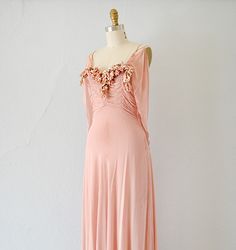
"[M]other came in to kiss her good night, cool, slim and fragrant, in a dress of rose crêpe with little wisps of lace over the shoulders. Mother's blue eyes seemed to mist a little."(Jane of Lantern Hill).
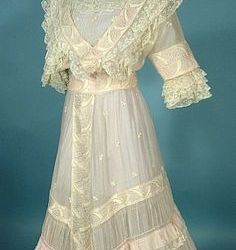
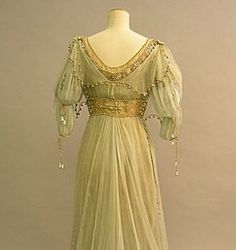
"She wore a green dress the first time I saw her...well, if any other girl had worn the dress, it would have been a green dress and nothing more. On Robin it was magic ...mystery...the robe of Titania. I would have kissed the hem of it." (Jane of Lantern Hill).
Another bonus (because her style is so iconic):
Ilse Burnley
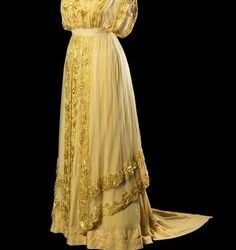
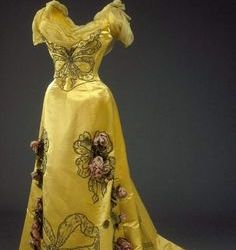
"Ilse in a yellow silk gown the colour of her hair and a golden-brown hat the colour of her eyes, giving you the sensation that a gorgeous golden rose was at large in the garden." (Emily's Quest).
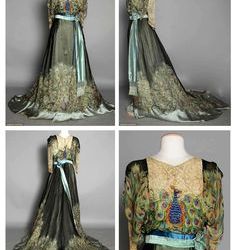
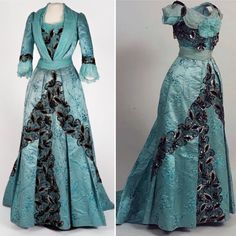
"Ilse, a glorified shining creature in torquoise-blue taffeta, looking the queen with a foam of laces on her full bosom and rose-and-silver nosegays at her shoulder." (Emily's Quest).
Hope you enjoyed this little compilation:) Feel free to add more ideas!
#lm montgomery#the blue castle#emily of new moon#pat of silver bush#anne of green gables#anne of island#rilla of ingleside#fashion#jane of lantern hill
98 notes
·
View notes
Text


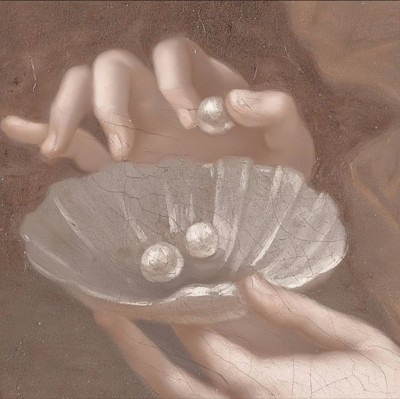
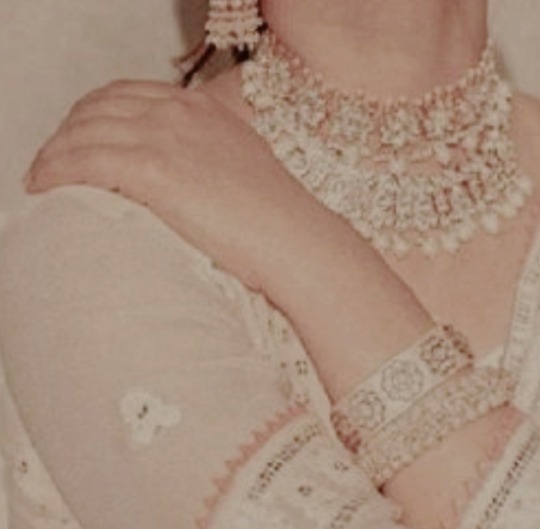
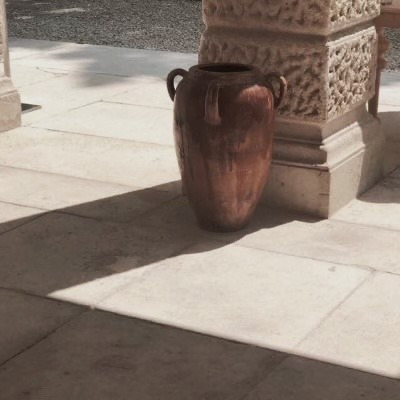

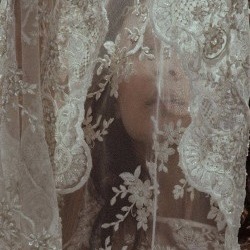

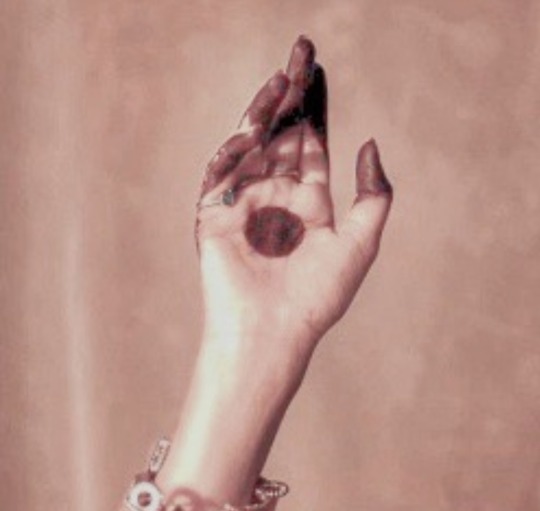
Arjuniya - 🪷🤍
“when Arjuna plunged into the water of the lake, which was tinged with the pollen dropped from white lotuses, lotuses opening on moonrise, (other) lotuses and red and blue lotuses, and which was agreeably perfumed with honey-drops, which was shaken by the notes of corpulent swans, whose four banks were decked with jewels, which had ripples due to gentle breezes, she vanished just there. The charmingly smiling one got up and on seeing around, was confused. He instantly saw himself (to be turned into) a wonderful, excellent lady,
who had a slim, fair, charming body like the rays of pure gold, whose age was that of a sparkling youth, whose face resembled the autumnal moon, whose hair was very dark, curly, glossy and shining with jewels, whose curls of hair on the plate (-like forehead) were brightened up due to the rays from the mark of red lead, who had vanquished Cupid’s bow due to the knittings of the creeper-like eyebrows being manifest, whose wagtail-like eyes were dark like clouds and sportive,
whose round cheeks were sparkling due to the bright lustre of the jewelled ear-rings, whose wonderful creeper-like arms were delicate like lotus-stalks, whose sprout-like hands took away all the beauty of autumnal lotuses, who had put on a waist-band made of gold and arranged cleverly, whose hips were shining with jingling girdles, whose beautiful place of hips was covered with a shining garment, whose lotus-like feet were very charming due to the jingling jewelled anklets, who possessed the skill in the various arts of love being manifested, who was endowed with all (good) characteristics,
who was adorned with all ornaments. Due to the illusion of (i.e. created by) the lover of the cowherdesses he forgot whatever belonged to his former body; and after that, being very much astonished, stood there, not knowing what to do.”
- Padma Purana, 61b-74a
#mahabharata#mahabharat#arjuna#arjun#Arjuni#Arjuniya#desiblr#desi tumblr#Moodboard#mythology moodboard#hinduism#Padma purana#I love herr 🩷#🪷#desi aesthetic#gopiblr#Mahabharata Moodboard#hindu mythology#Hinduism Moodboard#krishnablr#arjun x krishna#krishna x arjuna#???#Krishna x Arjun#Lotus-Moodboards
43 notes
·
View notes
Text
Today's The Blue Castle research is Valancy's green crepe dress. So first, here are a collection of descriptions of the dress:
She got a pretty green crêpe dress with a girdle of crimson beads...
She felt so miserably undressed in its low neck and short sleeves. And that low, crimson girdle around the hips seemed positively indecent.
Above it her eyes had looked like odd brown jewels and the girdle had given her flat figure an entirely different appearance.
It was nonsense to feel so—so—naked—just because her neck and arms were bare.
There's been a lot of talk about how the timeline of this book is a little all over the place. I found a collection of fashion sketches from 1912-1950 from the Brooklyn Museum that gives a wide range of fashion from the time. Here are some drawings that I think with some adjustments could match Valancy's dress, or at least parts of it. I will say I'm not a seamstress so I'm not sure if these would work with crepe fabric.
First up: 1914 dress goes to show that a lower waist still did occur in the 1910s, even if it was more rare than the empire/natural waist. Imagine it in green with the sash around the hips being replaced with the "girdle of crimson beads"

Here's an evening dress from 1915 that can also with some adjustments could fit the description. The tie at the waist here could very much match the "beads" as it looks more narrow. The skirt is likely more full and embellished, but I do like the top as Valancy notes that her "neck" is showing but nothing more than that.
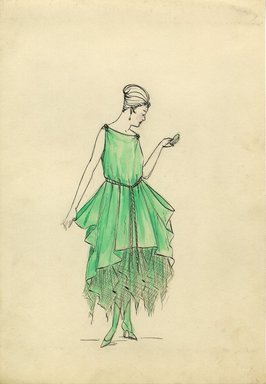
An afternoon dress from 1916 that will require a bit of imagination with colors as this is all black.
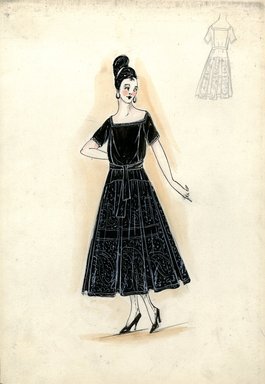
1918 day dress that might be my favorite. The colors would have to be switched, but overall this has the right shape to it to me. Plus there's a hat that works with the hat Valancy has!

1920 day dress. I like that this one is a bit more simple, which makes it feel a bit more likely an ordinary person could have a dress like this, again with a change of colors.
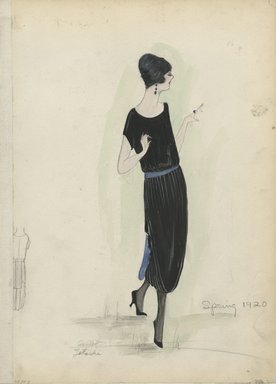
1920 evening dress. This one is fun because it's green just like Valancy's crepe dress. I think the only note is that the girdle would be red and not quite as voluminous at the side. This is another one of my favorites, maybe because the model is giving Valancy vibes.
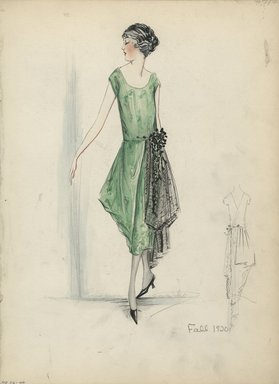
1921 day dress. This is a bit more of a toned down version of the previous one, again with some imagination about the sash being red and beaded.

1921 day dress. I think with just some shorter sleeves, this one works well with the description given. I know she doesn't have flowers as her belt, but also I wouldn't be mad if this was the design for a movie.

63 notes
·
View notes
Photo
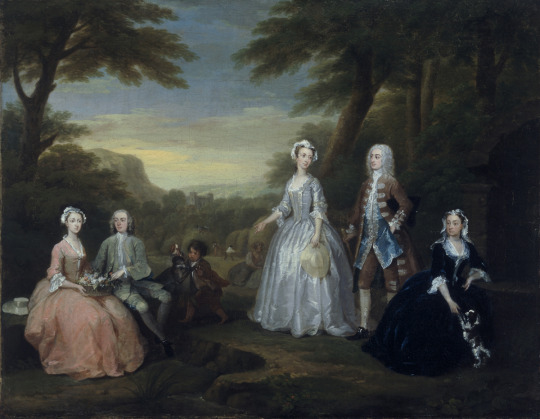

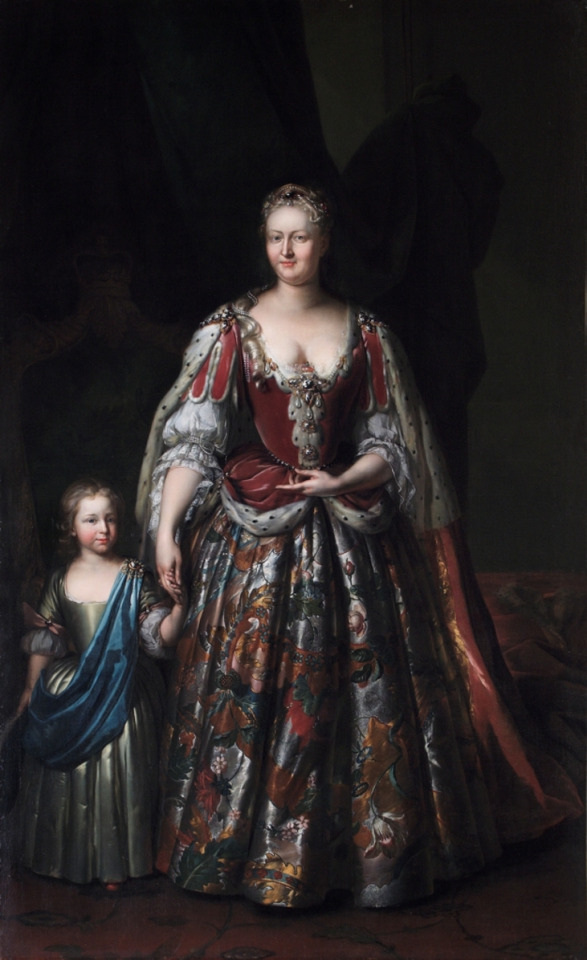
A few more from around 1730 (from top to bottom) -
1730 The Jones Family Conversation Piece by William Hogarth (Amgueddfa Cymru/National Museum Wales - Cardiff, UK). From Wikimedia 1200X932.
1730 Portrait of a Lady of the d'Hervart Family in a Yellow Dress, with Flowers in Her Corsage by Johann Rudolf Huber (Nostell Priory - Nostell, near Wakefield, West Yorkshire, UK). From artuk.org; slightly filled in shadows and slightly increased exposure 935X1200,
ca. 1730 Caroline of Ansbach, Queen of Great Britain, with her son the Duke of Cumberland by Herman van der Mijn (location ?). From Wikimedia 731X1196.
#1730s fashion#Georgian fashion#Rococo fashion#William Hogarth#cap#full skirt#Johann Rudolf Huber#split bodice#chemise#jeweled girdle#Caroline of Ansbach#robes
10 notes
·
View notes
Text

Fandom: The Silmarillion
Relationship: Maedhros/Thingol
Summary: Maedhros presents himself as a…diplomatic guest to Doriath, certain he can convince the king to do as Maedhros wishes him to if he only had the chance. It is possible Maedhros is less than prepared for Doriath than he expected.
AN: A gift for @jouissants! I hope the new year treats you and your family well! (´▽`ʃ♡ƪ)
AO3 | Pillowfort | SWG
Photo credit to Matt Nelson on Unsplash.
____________________________________________________
“In Beleriand King Thingol upon his throne was as the lords of the Maiar, whose power is at rest, whose joy is an air that they breathe all their days, whose thoughts flow in a tide untroubled from the heights to the deeps.” (Of the Sindar, The Silmarillion)
It had seemed like such a brilliant idea when he’d first had it. Maedhros should have been tipped off to the potentially subpar nature of the idea by the fact that it occurred between one and five in the morning, after a particularly strenuous week of dealing with his brothers’ appalling and sometimes shocking lack of diplomacy. Furthermore, when he mentioned it to Fingolfin, his uncle was less than enthused. Rather than taking this as a warning sign as he ought to have, Maedhros let his father get to him, and took Fingolfin’s implied disapproval as a signal that this was an important and necessary course of action.
There had been a guard to escort him over the threshold of Melian’s Girdle and into the darkness of Doriath.
If Maedhros had nursed any notions about seeing himself out when he chose, they were lost well before the party reached its destination. The winding path through thick foliage, past eyes in the shadows and footsteps overhead, through magical barriers and marchwardens’ outposts, was not something Maedhros could have re-created (or forged anew) on his own even if his life had depended on it. Even now, it was alarming to be in an area which he truly did not know. So much of Aman was familiar to him—they had roved all over those lands, and there was little there that might truly harm them, and the Valar to aid when it did. Middle-earth was not like that.
Continually, he needed to remind himself that this was not at all equivalent to his trip to parlay with Morgoth. There was no trap waiting to be sprung, and even if there were, any trap of Elven-make must seem a pleasant diversion by comparison with Angband.
The capitol of Doriath’s dispersed kingdom was Menegroth: underground, a joint labor of Elves and Dwarves and renowned throughout Beleriand for its beauty. Even so, Maedhros was taken aback with how spacious were the halls he was led through when he entered. Warm it was, and adorned with lovingly detailed tapestries and carvings and friezes, and unlike any structure Maedhros had seen in the west. It seemed to be neither “inside” nor “outside,” but an ongoing blend of the two which turned back in on each other and then separated again only to come together once more.
Upon their thrones sung from living stone, which seemed to sprout right out of the floor and meld back up into the ceiling, King Thingol and Queen Melian were as a part of Menegroth, as if they had grown up with the rest of the wild forest. They were hurried in neither speech nor gesture as Maedhros made his introduction and laid out his terms; no words they spoke between them, yet they seemed always to know one another’s thoughts. Where Maedhros would have expected to see jewels, the king and queen bore leaf and flower and berry; bright were their raiments, resplendent in all the colors of the forest of Doriath; keen and appraising were their gazes, yet removed, as though observing something of yet unknown import, which may resolve itself to nothing. Neither appeared overly welcoming.
Of all the Elves in Doriath—indeed, of all the Umanyar and Moriquendi in Middle-earth—it was King Thingol’s crystal clear eyes alone that reflected the light of the Trees as did the Noldor’s, for it was he alone who had set foot in Valinor and seen the glory of Laurelin and Telperion. Yet it was a blessing he had forsaken for the hand of his divine queen. Never in his life had Maedhros heard of a union of Elf and Ainu. He did not know what to think of it, except that it was unsettling. Too many things which were accepted fact in Aman seemed not to apply to Middle-earth.
The king and queen of Doriath accepted his bargain, and at the base of their dais, he was officially dubbed a guest of Menegroth. Now all that remained was for him to win the cautious king’s trust—and his alliance.
***
In Valinor, Grandfather Finwë had taught Maedhros to play a variety of little board games, challenges of patience and observance that had delighted the king of the Noldor. Father had taken no interest in them, but Maedhros had, and Grandfather seemed to take great joy in playing with his grandson, even when he had to remind the little Elfling of the rules a few times. The first time Maedhros had beaten him, Finwë had beamed and told everyone else in the palace about it, something that had made Maedhros strut about for days.
Sometimes, Grandfather would speak of Middle-earth, but on the whole, he seemed quite content to leave it behind, or so it had seemed to Maedhros as a youth. Occasionally, though, he would mention it, and of the things he had revealed, one was the longing with which he spoke of his friend Elwë, who had been lost on the long march west.
When first Maedhros had laid eyes on Elu Thingol, he found himself searching. As if behind that silky fall of shining silver hair, behind those deep gray eyes, behind gestures of those long, tapering fingers there was some piece of Finwë that had not yet departed the realm of the living. Here was one his grandfather had called a dear friend—and Maedhros would know why (very possibly because Finwë was simply an amiable sort, if not particularly deft in politics, and inclined to like anyone who did not give him good reason not to).
It helped also that the king was so pleasing to look on; Finwë had not made much mention of the fairness of his friend, of his elegance of face and hand, nor of his height. Maedhros was not accustomed to having to incline his head up to meet another’s gaze. He had heard rumor of this Elven king who had wed with a Maia, and now he supposed he knew at least a part of how she had become so enchanted with one of the Children.
The king and queen gave him a small chamber to himself. It was plainly furnished, but the structure itself was wrought with the same care and grace as the rest of the Thousand Caves. Some small, animal part of Maedhros had fretted about being stuck underground, but Menegroth was not at all the dark, dank hole he had pictured. Indeed, while he preferred still the high, airy halls of Tirion-on-Túna, Menegroth had its own exotic beauty to recommend it and all the time he encountered new details of it which had before passed by his notice.
It had been a relief to have a moment alone to evaluate what had passed since his first entry into the forest. However, his mind had skimmed over most all else prior to his introduction to the king and queen, and he kept returning to the sparse words Grandfather had shared of their acquaintance, though what his mind was trying to achieve by running in these circles, he could not say. It felt as though a thousand years had passed since Finwë’s murder, and also as if it had just happened that morning, as if Maedhros had only just found him.
Digging through his things, Maedhros had recovered a pendant given to him for excellence in academics by his grandfather. He studied the familiar shape and weight of it, running his fingers over the smooth surface as if it were some sort of talisman. Grandfather had even had it made by some other jeweler, so that even Father was surprised when he presented it to Maedhros.
“We will have your vengeance,” he had murmured, squeezing it in his palm before tucking it away again.
So they had all vowed.
***
What attention Maedhros had expected to receive from the king and queen of Doriath, he was not sure. Certainly he was a unique addition to the court, and the Wood-elves were not shy about staring, though they looked away if he stared back. There had to be a fair amount of interaction between himself and the monarchs, or the whole venture was in vain. The princess, at least, was bold and asked him many questions about Valinor, which he answered carefully, aware that he needed to not upset the truths they had implied already about their departure from that land. It was strange to speak to one who was the product of such a union as her parents’, but Lúthien did not seem troubled by it, even when others were uneasy.
Thingol always listened closely to Maedhros’ responses, and he guessed that the king wanted information about Valinor as well, but was as yet unwilling to ask himself.
One morning, some days after his arrival in Menegroth, the king invited Maedhros to his study after breakfast. It was not as large as Maedhros might have expected for the self-proclaimed king of Beleriand, but built with incredible detail: entire scenes were carved into the rounded beams that arced over the ceiling; tapestries of woodland vistas so vivid it felt like a hand could sink right into them hung against the walls; warm light flickered from the niches in the wall where lamps and candles might be ensconced. However, where Maedhros might have expected rows of books as lined the libraries and studies in Tirion, here there were scant few, along with a few dozen scrolls.
Thingol said nothing as he situated himself in one of the armchairs and observed Maedhros observing the contents of the room, left hand clasping his right wrist behind his back where he would have once folded his hands.
“Will His Grace now ask me about Avon?” Maedhros asked, turning to look at the king, who went on studying him impassively.
“Our guest seem to anticipate an interrogation,” he remarked in an unhurried tone. The high collar of his robe complemented the sharpness of his jawline.
“Does it not approach?” Before coming, Maedhros had made a painfully detailed study of Sindarin, intent on making sure nothing went by him in Doriath.
“You are living in my home,” Thingol remarked. “Would you prefer that I ignored you?”
“I would prefer your honesty,” said Maedhros.
“As I would prefer yours,” replied the king. “Though I have as yet no reason to suspect I do not have it.” Maedhros couldn’t tell if that was a lie or not.
“What is it Your Grace wishes to know?” Maedhros asked with a failed effort at courtesy, turning away from a small shelf of trinkets to fully face the king.
“If our guest mean to suggest the princess has been bothersome in her questioning, I will advise her to let it rest,” said Thingol. “She is a very curious sort; she always has been. But there is no need for our guest to be pestered.”
“The princess has been gracious,” Maedhros said. “Her forthrightness does her credit.”
“I am glad to hear it.” Maedhros was genuine, but even if he had not been, he never would have criticized Lúthien to Thingol’s face. There was no quicker way to get on his bad side; even Maedhros’ brief time there suggested this. The king said nothing more, and Maedhros shifted uneasily, his eyes turning to one of the tapestries, which depicted a glittering waterfall in thread that seemed to shift in color depending on the angle at which it was observed. He clenched his jaw, determined to say nothing more until Thingol revealed for what purpose he had invited Maedhros here.
Thankfully, this came about before Maedhros’ nerves wore too thin and obliged him to make another stab at figuring the answer out himself.
“You do not look much like him,” the king said. Maedhros’ attention snapped back over to him in full at once.
“My grandfather?” he surmised.
“Indeed,” said the king, leaning back in his chair, shamelessly studying his guest.
“No, I take more after my mother’s father,” said Maedhros.
“A great smith, I hear,” said Thingol, and Maedhros repressed a scowl. Naturally Finrod had given his grand-uncle a character roster of relevant figures back home.
“Indeed,” he echoed tonelessly.
“This is something which has no interest for you?” Thingol tilted his head slightly. His earrings jingled.
“I have done it,” said Maedhros. “But no, it has no particular interest for me.” To my father’s chagrin, he did not add. Fëanor had always been somewhat dismayed that only one of his children had any real interest in jeweling or smithing. However, Maedhros had shared something of his father’s interest in linguistics, if to a far less fanatical degree, and on this Fëanor had always been more than happy to advise him.
The king drummed his fingers on the arm of the chair.
“If there is something His Grace would ask of me, I would answer, if I can,” Maedhros said with the utmost graciousness he could manage. Thingol’s cool eyes hovered on his face.
“Your cousins, the children of Eärwen, have told me of my friend’s demise,” said Thingol. “Yet I find myself seeking more detail.”
“I believe Your Grace may prefer not to have it,” said Maedhros.
“Do you imagine we are unfamiliar with death here, in Beleriand?” Thingol asked, arching his eyebrows. “Rather, I would not force our guest to relive the experience. One’s first experience with death is never pleasant.”
Maedhros considered his response. The first impulse was to point out that Finwë had not been the first in Tirion to die—but Maedhros, of course, had no recollection of Míriel’s death, though Father had made them visit her body several times in Lórien. The second was to remark that he had seen so much death since Finwë’s murder that it hardly mattered. The third, which never fully surfaced, was a raw acknowledgement of how it had felt to walk into that room with his Grandfather’s skull split open on the floor—for Maedhros, who had never seen a body, who had never heard of a murder, who had never in his life seen so much blood come from an Elf.
“Death changes a person, I think,” the king observed quietly.
“Would the details make a difference?” Maedhros asked. “It will not change what has happened.” Something shifted in Thingol’s expression and some of the intentness of his gaze faded.
“Perhaps the inquiry was uncouth,” he said. “Grief drives one to strange ends. Sit, if you would.” He gestured to one of the other available seats. “My daughter does not always focus as she ought, and I would have more answers that she has not requested of our guest yet.”
***
Maedhros used to do better with down time. Even in Aman, he had preferred to be busy, but he hadn’t minded a late morning or a lazy afternoon or a few days of vacation, as long as there was nothing pressing on his mind. He had enjoyed ambling around the unpopulated areas of Aman with Father, exploring plants and rocks and things. Thangorodrim, of course, had left him with ample time for doing nothing. Recovery afterwards, similarly. He strongly suspected his brothers had given him tasks to complete in bed simply to keep him from bothering them. There was no other reason they had needed inventories tallied that frequently, or why Curufin had only then decided that it would behoove them to develop a method of desalinization.
Maedhros and Celegorm had planned the construction and management of the fortress at Himring before Maedhros’ departure for Doriath, but he found now that he was restless in absence of the ability to oversee its success himself. He was certain Celegorm had the fortitude to take care of Himring…but he had also been edgy since Alqualondë in a way that made Maedhros worry about impulsivity. Ideally, he would have been able to put Celegorm and Curufin together where hopefully they might keep each other steady (for Curufin too had been of perilous mood since their arrival), but for now, the establishment of Himring was too important to leave off until Maedhros’ return from Doriath.
In absence of the ability to micromanage the construction of his fortress, Maedhros set his mind to learning all that he could about Doriath. What better way to learn a kingdom than by reading their literature? Yet there were precious few books of any sort in Menegroth, nearly all written and edited by the king’s chief loremaster, Daeron. When Maedhros inquired with him about this shortage, Daeron huffed.
“Ours is mainly an oral tradition, you see,” he said from his desk where Maedhros had cornered him. “I have been trying to coax them to the notion of writing things down, but…” He made a flippant, frustrated hand gesture. He dressed far more plainly than Maedhros would have expected from one in his position, remarkably understated relative to the royal family, particularly given that he came from no notable bloodline that Maedhros had heard. “I invent an entire alphabet for them and do I see any gratitude for it?” Maedhros’ eyebrows lifted slightly. “At least the Naugrim appreciate it,” he added in a mutter.
“The Cirth are your creation?” he said.
“Indeed!” Daeron perked up at once to be asked about this. “Very quick and easy to carve into wood or stone! You may see individual runes here and there about the kingdom, but as for long-form writing…” He frowned. “I will not give up yet, but much work remains to be done.”
“My father created our alphabet,” said Maedhros, for some reason he could not discern himself.
“Ah, yes? I should like very much to speak with him! We might compare notes,” said Daeron cheerfully. For a moment, Maedhros almost regretted missing the chance to see Fëanor try to talk linguistics with Thingol’s minstrel who seemed as much a jester as a loremaster—he had on at least one occasion which Maedhros had seen since his arrival, spontaneously composed and recited an insult entirely in rhyming couplets at one of the hall’s guests.
“He’s dead.”
“Well, that’s a shame.”
“Do you have any other books?”
“I will speak to Lúthien,” said Daeron. “I suspect she has not made much study of the ones I gave her; perhaps she will relinquish them for a time.”
A few days later, Daeron did indeed deliver a load of questionably-bound books which looked too heavy for his skinny arms, several of which were treatises on Doriathrin history into which Maedhros dove with a vigor. But he also did not want to lose practice in combat, particularly as he was not convinced he was yet as skilled in wielding a blade with his left hand as he had been with his right. He expected to be denied access to any weapons by Thingol’s captains, but to his surprise he was permitted full access to the training yard and everything in it.
“Do you think we fear so greatly a single Noldo, surrounded by our warriors?” Mablung intoned, looking faintly unimpressed. He was wise enough not to comment on the individual in question being a lone one-handed Noldo.
It was sound enough logic.
Maedhros opted to wait until evening to practice, when there was least likely to be anyone about. He misliked the notion of letting the Iathrim see him train, but his body was itching for exercise, and he did not fancy trying the various climbing games which served such purposes for them. Even their ball games were played in trees!
When he began, he was satisfied he had no audience, but naturally, that did not remain the case. He could have done without the audience being the king of Doriath, though.
Thingol lingered on the sidelines of the yard, and Maedhros struggled not to grind his teeth with the knowledge that he was being watched. He hoped that Thingol would bore quickly and move on, but this was not the case, and though he tried to continue through his forms and exercises as if no one was there, eventually he stopped and turned to face the king, sweat beading along his hairline.
“Perhaps His Grace cares for a lesson?” It was far too audacious and certainly crossed the line into rudeness, but Thingol seemed torn between offense and amusement, something which only galled Maedhros more. “The people may take heart from a king who can defend himself.”
Now he had threatened Thingol’s pride, and he could see it.
“If it will amuse our princely guest,” Thingol said, reaching without hurry for the clasps of his outer robe, which he shed, stepping out of it in the more close-fitting pants, tunic, and vest. That day he favored shades of green and yellow, which made him look as though he himself were a bright growth of the forest, blooming under the dark shelter of her branches.
Maedhros was in a position to bristle at this patronizing tone, and he knew he had asked for it by taking a jab at the king, but it did not make him back down. Instead, he watched as the king chose a wooden blade from the rack, twirled it in his hand, and came to meet Maedhros in the yard.
“Would you care for a rest first?” he asked, and his tone did not seem entirely gracious to Maedhros’ estimation.
“No,” he answered, sliding into stance. Thingol was not entirely relaxed, but he also did not seem to be taking this as seriously as Maedhros, which was only his own mistake. If he thought Maedhros would go easy on him because he was a king, or because Maedhros lived as his guest in Doriath, he was sorely mistaken.
For some moments they circled each other. Often, Maedhros was happy to let his partner take the first swing and perhaps reveal something useful to him, but he was too worked up to be so patient now, and he guessed Thingol would simply walk away at some point if Maedhros did not make the first move. So he did, and Thingol parried him with a careless flick of his wrist, knocking his blade well off to the right.
“Was that the beginning of the lesson?” he asked.
Maedhros was a mature Elf. Maedhros was not impulsive or hotheaded. Maedhros should have known better than to let the king goad him. And yet it took all his restraint not to immediately lunge after him again.
“I hope His Grace is attentive,” he said instead. The corners of Thingol’s lips twitched.
“Entirely,” he replied.
Again, Thingol circled him almost lazily, the blade gripped loosely, his off hand resting with his outer wrist against his lower back. Again, Maedhros made a first jab. Again, Thingol evaded, stepping to the side, then parrying Maedhros’ follow-up strike, and making a half-hearted repost, which Maedhros batted aside with ease.
“Our guest has acquired this skill with admirable speed,” Thingol remarked as they eyed one another. “Given how short a time he has been in Beleriand. I do not imagine this was a talent much needed in Dor-Rodyn.” This was a hint, but Maedhros was too committed to back out now—he had challenged Thingol and could not walk out on his own challenge.
“It is in great need here,” said Maedhros. “If one does not learn quickly, one dies.”
“It is an unfortunate reality,” Thingol agreed, sobering for the first time since Maedhros had addressed him. A shadow came briefly over his eyes. “We have tried to amend this as best we can, but even our queen’s power may only reach so far.” Maedhros could have struck then, when the king appeared distracted, but he waited until Thingol’s attention was fully focused on him again before making another ineffective effort.
“It seems we may be here for some time,” Thingol observed.
“His Grace seems rather content to let me do all the work,” Maedhros said.
“Ah, but I thought I was receiving a lesson?” Thingol was mocking him. “Perhaps, with our guest’s permission, I might speed things along? I should not wish to keep him too long.”
“Please, Your Grace,” said Maedhros, a nearly sardonic edge creeping into his voice despite his best efforts at appearing polite. “By all means.”
Thingol darted in and harried Maedhros with a series of light, lightning fast strikes, which he was obliged to parry even if individually they would not have done much harm.
“Do you know when the queen first raised her shield, that which we call the Girdle of Melian?” he asked when he withdrew, leaving Maedhros’ heart beating much quicker than it had been.
“I do not,” he admitted.
“It is not necessary for our guest to know,” Thingol said with a shrug. “Yet relative to our time in Beleriand, it was quite recent.” Again he moved in, and danced around Maedhros, feinting repeatedly, forcing Maedhros to spin and prepare to block him, though Thingol never took a genuine swing at him.
“Does our guest imagine then that I sat by and allowed my friends to fight and die on my behalf, and raised no weapon in my own defense? Who does he imagine led them in battle against the ills of Bauglir and the dangers of Middle-earth?” Once again, when Thingol withdrew to a safe distance, he talked.
Maedhros stepped forward to make another assault, but Thingol knocked his blade aside seemingly before their weapons had even touched and then rained down on Maedhros blows of great weight and power, forcing him to step back as he parried, or else let his arms take the full force of Thingol’s attacks and quickly become exhausted.
“Tell me, Maedhros Feanorion,” said the king of Doriath as he forced Maedhros’ weapon back towards him, “do you think I can hold my own?” Maedhros was flushed and panting then, but Thingol’s assault only renewed in vigor until the wooden edge of the sword swatted repeatedly against Maedhros’ fingers and sent his own weapon clattering to the floor.
Maedhros’ chest heaved; his back was damp with sweat. He found he was not as upset by being proven wrong as he might have been. Rather, he felt stirred to try again, and unwilling to let Thingol go and make no more of this.
“Well. I imagine that is enough for one lesson, hm?” Thingol removed his sword from Maedhros’ chest.
“I certainly would not wish to tire His Grace,” said Maedhros, as if he had not just lost the bout. The king paused from where he was turning away. Maedhros’ heart skipped a beat, his fingers itched to reach for his training blade again, eager to feel the weight of Thingol’s sword against his again. This time he would do better.
“Perhaps our guest imagines I have nothing else to do but indulge him,” said Thingol. “Unfortunately, this is not the case.” He set the sword back on the rack. “I will have to engage him another time. I’m sure he will wish to occupy himself with more practice before then.”
Maedhros could not deny his disappointment that he would not get another bout out of Thingol that day. But he also recognized when he could push a thing no further, and he let it lie, giving the king a small bow as Thingol exited the training yard.
“Another time,” he agreed. His exhilaration took hours to cool.
***
“How is your brother?” Maedhros pulled his attention from the sunlight slanting through the gaps in the tree leaves to see the king standing nearby. Celegorm’s letter was still pinched loosely between his fingers, folded. By all appearances, Thingol’s messengers had given it to him unmolested, and Maedhros alone in Menegroth knew its contents.
“Busy,” Maedhros said at last with a frown. It was not so much that he did not trust Celegorm with establishing Himring—well, actually, that was it. Maedhros did not trust anyone but himself to do it properly, but as was a continual irritation to him, he could be in only one place at a time, and manage only so many things at once. Moreover, Maglor was already whining at him that the Gap (which he had since named after himself) was going to be too hard to defend, and Caranthir had been dead silent since departing for Thargelion. Curufin sent update letters that read more like inventory lists than correspondence and always demanded more supplies. The twins’ letters directly contradicted each other, when they could be bothered to send any.
“Perhaps our guest should like a leave to go and visit,” the king suggested, though he did not seem especially thrilled by the idea. For some reason, this grated Maedhros—perhaps the reminder that he might depart only on the leave of Elu Thingol, a leave which he plainly did not wish to give. This was something Maedhros had forgotten in his brilliance at proposing this idea: how much he hated being in the debt of others, or being made to ask permission for things.
He tried so very hard to control the temper in his eyes when he looked at the king.
“No. I put him in charge because I trust him.” He would just trust him more if he was there to oversee it.
“Still. It might put your heart at ease.”
“It would put my heart at ease to have the alliance of Doriath,” Maedhros snapped, straightening up on the low bench where he was seated. The king regarded him for a long moment in silence, and then he said:
“I see this is a bad time. I will leave you be.” But when he tried to leave, Maedhros turned to face him fully and said:
“No, I do not believe it is a bad time. Let us discuss it. I do not understand what world in which an alliance with us could be worse than facing Morgoth alone; perhaps His Grace can explain that to me.”
The king turned back to him and there was a low flame in those cool eyes.
“A blade from a friend kills no less than that of an enemy,” he said. For a moment, Maedhros hesitated. Was he trying to imply something? But he brushed it off. If news of the Kinslaying at Alqualondë had reached Doriath, Maedhros would have heard about it. Surely.
“Do you consider me your enemy?” Maedhros asked boldly, rising to his feet.
“I consider you unknown,” said the king stiffly. “And had you been long in Beleriand rather than the Blessed Realm, you might yourself be warier of the unknown and unaccounted for.”
“Perhaps that is why you hide behind the curtain of Doriath and will not aid us. Perhaps the king forgets the years I have spent in Beleriand already.”
The king’s eyes narrowedto slits; it was one of his few apparent vulnerabilities: it was always easy to see when he was angry.
“I trust you not, because you have proven yourselves neither trustworthy nor competent,” he said. “If it is your desire to break yourselves against the walls of Angband and meet such an end as your father, you need neither my aid nor my permission for such things. But I will not command Elves who look to me for security to join you. Tell me what you have done in this time that warrants any trust or reassurance on my part. Was it the strife which seems apparent between your people and those of the uncle the king? Was it your own misjudgment of Bauglir’s abilities? Is it the fact that you clearly do not trust your own brothers, or your refusal to make an effort to understand those whom you would seek to call for aid?”
Maedhros’ jaw was so tight he could barely force his mouth open to respond.
“At least we are doing something,” he said. “And if we fail, no man will call us cowards who let others do our fighting for us.”
“Once again you show your arrogance as a princeling of a far-off land,” said the king, “if you think truly that you are the only one doing any fighting in Beleriand, the only one who stands against Bauglir. More ways to combat his power there are than to fling oneself against his blade in hopes of denting it.”
The chain of Thangorodrim was tight around Maedhros’ wrist; he could feel the bloodless ache of his fingers, the pain in his shoulder which was so constant it transcended the perception of which his mind was capable. The thirst—
“I will take my leave, Your Grace,” Maedhros spat, and did not truly wait for leave before striding past the king, back into the palace, to find some place he might collect himself and plot his next move.
***
It had been a bad move allowing the king to throw him off-balance with the allusion to his capture. It had been five years since then—he ought to know better than to let himself think on Thangorodrim when he was not alone. He reconsidered, and when the king called Maedhros to his study, he was ready.
“Does His Grace look to continue our discussion?” He leaped on the king as soon as he stepped into the room.
“I do not,” said the king. He stood near the center of the room, hands folded behind his back, not quite looking at Maedhros. “Rather, I…wished to apologize.”
Maedhros sucked in a breath to snap back a cutting retort, only to pause and realize nothing had been said to him which warranted a retort.
“Pardon?”
“For earlier,” said Thingol. “I was…too harsh. There is no shame in death or capture by Bauglir or his forces; his strength and cunning are great. Yet I would not have it said that my people shrink from a fight; that they are unfamiliar with war and pain and loss; or that the Girdle is a panacea for our problems. Even this power of the queen’s reaches only so far, does only so much, and takes a great deal of energy from her.
“You have been a leader of your people only a short time; mine have followed me since we left Cuiviénen, to which there is no returning. They look to me to protect them; I will not spend their lives wantonly; I would not ask them to spill their blood on a poor gamble.”
“You think me a poor gamble.”
“I have not decided yet.” The two Elves regarded each other a long moment, and then Thingol said: “Nevertheless. I would take back my words of this morning.” He left space here for Maedhros to make some similar concession, but Maedhros found it harder to shape those words with his mouth than expected.
“It would be better for us to be friends,” he said at length. Thingol could not have known that this was, effectively, a Feanorian apology.
“It would certainly be better for us not to fight,” said the king. Maedhros bowed his head in agreement. “Perhaps to this end,” he said, when Maedhros said nothing, “we might refrain from assuming the worst of one another’s intentions.” That was certainly directed at him, and Maedhros felt duly chastised.
He had treated his engagement with Thingol like a battle, when he was here to make friends, and show to Doriath that he—and by extension his people—were trustworthy and steadfast allies. He had allowed his petty personal peeves drive him to anger, and quite possibly had done damage to his relationship with the king. And if he harbored resentment against Doriath for the Girdle, it was primarily out of envy—would that he could stash his people behind the queen’s protection as well!
“His Grace’s argument is sound,” Maedhros allowed. “I would not expect less from the lord of such a noble kingdom.”
Thingol made some noise that sounded doubtful, but he did not criticize Maedhros for his effort at mollifying flattery.
“Then let us put it behind us,” said Thingol, and Maedhros did not disagree.
***
Maedhros would not have said he avoided the queen only that—Melian was a Maia. And Maedhros could not know what news she might have received from her Ainur kin even in her isolation from them, or what she might have gathered from the Arafinweans even without their knowledge.
There was a knowing way she looked on them all that made his nerves itch.
Nevertheless, it was her home too, and it was impossible to evade her entirely. Maedhros happened on her one day while entering the Hall of Song. Here was a place the architects of Menegroth had clearly put a great deal of effort. The vaulted ceiling was easily twice as high as that of the throne room, and it was as brightly lit as though afternoon sunshine burst through the western wall. While Maedhros was not particularly attuned to acoustics, even he could tell that the sound of the room was carefully structured to benefit the musicians within.
Maedhros was not much of a musician now—not that he had been one before, but all of Finwë’s grandchildren had known their way comfortably around at least one instrument. Perhaps it had been mere curiosity which drove him here, to see what instruments the Iathrim kept lying around.
Melian was there, but he noticed her only when he came around a hanging curtain to find her seated on a circular couch, observing Daeron, whose back and heavy mane of microbraids was to them. The chief loremaster he might be, but his love of music certainly rivaled and perhaps exceeded his love of language and history, and he did not seem to notice them at all as he played or composed or simply larked about with several instruments at a time, weaving a harmony clean and clear, rapidly changing yet always complementary.
The queen gestured for Maedhros to sit, but he did not, only came to stand near the couch’s edge.
“Marvelous, isn’t he?” she said quietly. Maedhros inclined his head. Musician he might not be, but critic certainly, and he almost smirked at the thought that here was one who would give Maglor a run for his money in the field of music. Perhaps he ought to put that in his next missive to Maglor’s Gap.
Nevertheless, it was not clear Daeron wished to be observed, or even knew that it was happening, and Maedhros had no great desire to pass extended time with the queen, so he promptly turned to go.
“It grieves him,” said Melian without turning. She spoke this way often, with no lead-in nor explanation, but simply opening with her point and leaving the Elves around her to grasp at the context themselves. “As would many, he would shield grief from a stranger with anger.”
Maedhros was silent a long moment trying to think of what past moment or conversation to which Melian might be referring.
“…Daeron...?” he ventured at last.
“Elwë,” she said, and she was the only one Maedhros had heard call the king thusly. “You were not here before the Girdle, when this land was known still as Eglador.” Melian never troubled herself with the indirect polite speech Elves used where particular courtesy was needed. “You saw not the struggles of the Iathrim then, when first Bauglir returned to Beleriand, or those things which heralded his arrival.” There was a faint curl of Melian’s lip there, on his name, and a flash in her dark eyes. “Many died then, for they were not armored for combat with orcs shod in iron with the might of Angband behind them. Still the king grieves the death of Denethor, son of Lenwë, whom he was unable to reach timely with his aid. Once, our realm touched that of Círdan at the sea.”
Maedhros guessed then that one way or another, the queen must have been aware of his spat with Thingol earlier that week.
“Consider those who have died in defense of this land already,” she advised. “And be not so quick to dismiss them, for you may touch on wounds well-hidden in Doriath.” Maedhros wanted to retort that many Noldor had died as well, his father among them, but he restrained the impulse, as it was not relevant to Melian’s point, and he did not want to appear childish. She was not diminishing the losses of the Noldor.
“I think you should visit the south gardens,” she finished cryptically. Maedhros furrowed his brow faintly, and Melian smiled serenely, but said nothing more.
More out of curiosity than anything else, Maedhros found himself meandering towards the southern gardens of Menegroth after taking his leave from Melian. When he arrived, the king was there, tending to some of the plants, and he welcomed Maedhros, and they spent many hours in that garden talking of things of pleasingly little import.
***
Looking at his reflection in the mirror only made Maedhros angrier—he looked twice as disheveled as when he had sat down, and there was an unbecoming flush in face, and his eyebrows were beetled on his forehead. All over something he had once done with ease—indeed, something in which he had once taken great time and pride.
He was accustomed to having someone now to help him, and had not wanted to ask his hosts to send someone. How hard could it be to braid one-handed? The Sindar as a whole seemed to take a more relaxed view on unbound hair, so he had felt reasonable enough wearing it down on the day-to-day, but for the feast they were throwing that night, it felt imperative to wear his hair properly.
Only what he had now looked more like a rat’s nest than a neat set of Noldorin braids, and he had bent the teeth of one hair comb already in his frustration, and he was quite sure he was tardy for the start of the festivities.
When the knock came at the door, he was slumped over the vanity, running his mind in circles trying to think of some way to finagle what he wanted, and the sound made him jump and bang his knees against the table.
“I’m coming,” he said, barely keeping the snarl out of his voice.
“Oh good,” came the voice of the king. “I worried our guest had grown tired of us and taken his leave.”
“I would not be so dishonorable,” Maedhros said stiffly.
“The queen had a notion of something our guest might wear. May I come in?” Maedhros covered his face with his hand, dragging it down.
“I am not yet ready,” he replied, grabbing a brush to try to smooth out the worst of the damage he’d done yanking on his hair.
“I would leave it here, but they can be tricky to attach alone.” In Maedhros’ dark mood, he wondered if that was specific to him—not that he could blame Thingol for that, since clearly there were things he could not do himself.
Swallowing a growl, Maedhros got up and went over to jerk the door open, promptly almost choking on his own tongue. The king was a lovely sight to behold most days, but he was resplendent for the feast, and in a way which would have been entirely out of place in Tirion, which made it only the more appealing. His robes were a lush blue and green, his jewels red and framed with pearls, and with kohl there were swooping symmetrical patterns drawn across his face and throat, which made his gray eyes stand out all the more arresting and complemented the elegant cut of his cheekbones flawlessly. His silver hair was gathered up into looping braids which did not quite bare the back of his neck (something which Maedhros understood to be a touch risqué among the Iathrim).
“I’ve interrupted our guest,” Thingol surmised, taking in Maedhros’ appearance. “My apologies.”
“Hardly,” said Maedhros with irritation more directed at himself than the king. “There would need to have been progress to interrupt.”
“Perhaps I could show our guest something of the style of Menegroth,” Thingol suggested smoothly, which Maedhros recognized at once as an effort to offer help while sparing Maedhros’ pride. He was too weary of the whole hair affair to refuse on principle. He stood aside to allow the king into his rooms.
Maedhros took his seat at the vanity again at Thingol’s gesture, and the king set something heavy on the table to the left.
“I will warn His Grace my aptitude for braiding has waned,” Maedhros said dryly.
“That will be no worry,” said Thingol, reaching for Maedhros’ brush. “I shall do it for our guest; that will be easier than trying to explain it.” Maedhros froze, and the flush that crept into his face then was of a different nature. He knew—of course he knew, Finrod had told him—that there were differences in social culture between the Sindar and the Noldor but—did Thingol know? Surely he could not—could not know how intimate a thing he had just proposed. Maedhros could name only a few people who had braided his hair, outside those who had done so only by necessity when he could no longer do it himself.
If the king noticed Maedhros’ discomfiture at all, he made no remark on it, and was swiftly undoing the clumsy, partially-done braids Maedhros had created earlier before Maedhros had recovered himself. Maedhros wished he would speak, say something, anything—give Maedhros something to think about beside the fact that Elu Thingol’s fingers were combing through his hair—Maedhros’ throat felt like there was something stuck in it—once in Tirion his hair had been considered his great beauty, the brown underlaid with a glossy layer of red inherited from Mahtan—(Did Thingol find it beautiful?)
Maedhros was gripping one of his combs so tightly his knuckles had gone white, and it was only when Thingol began to section his hair out for braids he realized he was not wearing his prosthetic. Normally, he was never seen without it, save by family or close military attendants, but he had removed it earlier, frustrated with its failure to help him achieve what he wanted. His eyes darted over the table; it was sitting there, just in front of the mirror…He could reach for it now, but that would only draw attention to it…
“It has been some time since I did this for another,” the king remarked. “Her Grace does not need it, of course, although sometimes she enjoys it…when Lúthien was younger, I would do it for her.” A smile passed over his face, though he did not raise it from what he was doing.
“It is. Less common among the Noldor, I think,” said Maedhros haltingly, his tone tightly controlled.
“Oh?”
“Indeed.” And on that, Maedhros would say no more. The king worked on in silence, and Maedhros tried to imagine some world in Tirion where the king braided the hair of a foreign envoy. The scandal! His fingers were firm and steady, never pulling, and gently tugging apart the snarls Maedhros had created before. His nails scraped lightly over Maedhros’ scalp, sending frissons of pleasure down his back, and Maedhros felt acutely aware of his own breathing.
“There…” Thingol murmured, after just a second, and an entire eternity had passed. He reached for the thing he had set down, which turned out to be a rather complex hair clasp, wrought of wood and bone in the style of the Iathrim, which he affixed over the series of braids he had woven into Maedhros’ hair, two of which were curled into small buns just behind each ear. “Ah. Perfect.” When the clasp was secure, he looked up into the mirror at last, and Maedhros was relieved his own face looked composed.
The person in the mirror felt like a stranger, as if he was gazing through some cursed lens which showed him only visions of the past. But not quite—that expression was one that Nelyafinwë would never have worn, not like that.
It was in an Iathrian style, but…the last time Maedhros had worn his hair so elaborately had been before Alqualondë. There had been a time he would not have dreamed of being seen in public with his hair down. His hair ornaments had filled chests, and varied by season and style. It was not only that he was unable to render it himself anymore—it was that there was no cause. It seemed frivolous to him now, with so many more practical matters at hand, and for whom would he be doing it anyway?
“Does it please our guest?” the king asked, tilting his head slightly. “If not, it may be undone. Perhaps he would better like something in the Noldorin style, though he would have to explain it to me.”
“No,” said Maedhros, displeased with the faint unsteadiness to his voice. He firmed it up before answering again: “No, this will do.”
“Damningly faint praise, I fear,” said the king, his lips twitching in amusement. Maedhros watched his reflection in the mirror.
“I do not much concern myself with such things anymore,” he said, and his tone came out harshly, which he nearly regretted. He was edging too close to his and Thingol’s fight of before, and he did not wish to seem as if he were petulantly rehashing grievances. “It seems to serve no purpose.”
“Joy is a purpose, is it not?”
“There is joy in safety.”
“There is also joy in beauty,” said Thingol, which halted Maedhros cold. “And what purpose does safety serve, without joy?” He smoothed Maedhros’ hairline just a touch, a gesture which Maedhros could not decide if he ought to permit or not, but which was ended well before he came near an answer. “A people at war must have something to fight for, beyond the meanest survival.”
He stepped back from the vanity bench and held a hand out to Maedhros.
“Come,” he said. “Let us have some joy.”
And Maedhros came.
***
Maedhros had been rolling his right shoulder every few minutes for some time. It hated the hunched-over position he sank into at his desk any time he spent more than thirty minutes there. But having to pen instructions to six brothers (well, technically more like five, as Amrod and Amras got one letter with only a few personalized sentences apiece) as well as updates to his own king took quite some time. While Maedhros had much practice writing with his left hand by then, he still did not have the careless deftness and fine motor control he had once possessed with his right, and it took more care to make his pen strokes clear.
While he preferred to work in his personal rooms, he had forced himself out into one of the common areas of the palace, because, he reminded himself, he was here to make friends. It had occurred to him that he was perhaps not the best suited to this task—indeed, had never been the best suited to this task. Nevertheless, all of his immediate family were certainly less suited, if for different reasons.
This was how Thingol found him.
“How long have you been at work?” Thingol’s low, throaty voice broke Maedhros out of the haze of letter composition.
“Eh? Oh—I couldn’t say.” He shrugged with his left shoulder. “Some time. I’m not yet finished.”
He had been debating a personal missive to Fingon. What was left of their friendship, he couldn’t say. They had spent time together during his recovery, but that duty had passed on to Maedhros’ brothers when Fingon was needed by his father, and they had not spoken then of anything that mattered. Maedhros recalled the bitter words he had thrown at Fingon back in Tirion, the accusations he had leveled against him, then in the shadow of the lies Melkor had sown amongst them, and the anger with which Fingon had responded. Maybe Fingon’s actions in Thangorodrim had been purely out of concern for the state of their people, or a sense of familial duty to a cousin. In any case, they had not written since parting ways except for Fingon to act largely as a conduit for Fingolfin.
“Perhaps you could indulge a rest?” Thingol suggested. “There is a part of Menegroth I believe our guest has not yet seen.” Maedhros suspected there were many parts—even most—of Menegroth that he had not yet seen.
He looked over his papers for a long moment.
“If Your Grace would allow, I will put these away first,” he said.
Afterwards, he met Thingol in one of the crossroads of Menegroth (the labyrinthine halls of the palace meant Maedhros had long since had to surrender his pride about asking for directions, or else be perpetually hours late to engagements and show up somewhat manic) and the king led him off into an area of the palace he was sure he had never been before.
“I assume Your Grace means to tell me where it is he is leading me,” said Maedhros after a long stretch of silence. He was learning that the king was fond of games.
“Menegroth’s location was chosen carefully,” said Thingol, beginning, naturally, a roundabout explanation. “There are many things that recommended this place to us specifically—and one of those things was the presence of natural springs. Some of them supply a portion of our water. Others…” He trailed off and said no more.
“Another mystery,” said Maedhros, unable to entirely keep the dryness from his voice. Fortunately, Thingol looked more amused than offended.
The murals on the walls as they continued offered a hint—they began to depict a number of Elves dipping into streams, ponds, and artificial pools, or lounging on towels, or combing out long, unbound hair (an image that would have scandalized on a public wall in Tirion).
“Baths?” he guessed as Thingol gestured him through an archway. A sweet, soft smell that Maedhros could not place wafted in the air.
“Well-spotted.”
Public baths existed in Aman, but were mainly the province of the Vanyar. Maedhros had visited only once, in the company of Prince Ingwion, but he had declined to join him in the water.
Thingol led him around the edge of a large room, segmented with partial walls and wooden screens, where a number of Elves splashed and relaxed in the water, and over to a quieter, more removed room, attached, but apart from the rest. From an Elf who had appeared behind them, Thingol took a stack of fabric, some of which he passed off to Maedhros. It consisted of a simple brown robe with a single tie around the waist, and a towel.
He was not sure quite what he expected then, but it was not really for the king of Doriath to start stripping in front of him. For the briefest moment, he was inclined, as a small child, to cover his own face with the towel.
In this, as in all other things, Thingol moved with a stately grace, removing himself from his fine clothes and setting them on the polished hooks along the wall. Off came the necklaces, the rings, the bracelets, the headpiece, all set neatly aside, until all that remained were a pair of filigreed golden earrings dangling from his earlobes, a shimmering segment of opal hanging from the lowest point of each, accentuating the long line of his neck.
The king, as did most of the Wood-elves, bore striking ink designs up and down his body. His were more abstract than others, particularly the younger generations of Elves, but Maedhros could still clearly make out a stag with a full rack, a cluster of trees, a burst of stars, and a variety of flowers. It seemed in absence of the Noldor’s natural inclination to dig for gems, they had found another way to adorn themselves. Maedhros was struck with the desire to trace his fingers over one of them, but he quickly pushed that aside.
There was also. Well. That did not bear commenting on. (Except that it did, and Maedhros supposed such proportionality was only reasonable, but he was still surprised, and not unpleased, though he had no cause to have any feelings about it, in his own judgement.)
“No need to fear, you won’t drown,” Thingol said, which was baffling for a moment, until Maedhros realized he was standing there still fully dressed, holding the robe and the towel, while Thingol was winding his long silver hair up onto the back of his head. “Although I may find someone to hold our guest’s hand if he prefers.”
“I can swim,” said Maedhros with some heat, setting aside the robe and towel to get to removing his things.
“Oh, good. It would do nothing for our diplomacy if our guest reported to his uncle that we had tried to drown him in a bath.” It was a surprisingly bold jest given their situation, and Maedhros found himself wondering if Thingol habitually made such remarks, or if he guessed (correctly) that Maedhros would not take it wrongly. The king stepped into the pool, which appeared to have some stairs, and a low, wide ridge partway down, on which he settled, tilting his head back in obvious pleasure. The water burbled quietly.
Maedhros took the moments where Thingol’s attention was on the water to quickly undress and set his jewelry aside. The only moment he hesitated was when it came to the prosthetic. It could take water exposure, but fully submerging it was a poor idea. He could simply make sure to keep that hand out of the water, but he was still accustoming himself to being aware that hand was not really his anymore.
“None will enter this room without my permission,” Thingol offered up, from where he sat with his head leaned back against the rim of the pool, eyes closed. “Our guest may be assured of privacy.”
Still, Maedhros hesitated. They were alone—but he was not. And for beings accustomed to beauty in all their things, reality could be…poorly received. But why should that be his problem? Maedhros reasoned. The king could not balk against something he himself had invited—and since when did Maedhros care if he made others uncomfortable? (Perhaps it would tell him something, to see the king uncomfortable.)
He slipped off the prosthetic hand, set it with his things, and strode into the pool, only to promptly flail backwards.
“It’s cold!” he exclaimed without thought. He heard a noise from the king, which he realized was partially-suppressed laughter.
“I never said it was a warm spring,” said Thingol without opening his eyes. Maedhros drew in a sharp breath from between his teeth, but went on and settled on the opposite side of the pool.
“Of course. His Grace would never be so misleading to a guest, I’m sure,” said Maedhros, a pointed note in his voice. It was hard to tell from the angle, but he thought the king was smiling. When he lowered his chin to look directly at Maedhros, his expression was mostly serene, but there was a glitter in his gray eyes.
“Certainly not,” he said. “That would be terrible, and amusing for no one.”
“Certainly,” said Maedhros. “His Grace has a more elevated sense of humor, naturally.” To this, Thingol did not respond, but the hint of a smile twisted his lips, and he looked aside at one of the walls, decorated with carven friezes and resplendent with bright paint.
Maedhros, without thinking, rolled his right shoulder again, and dug the fingers of his left hand into the muscle. He was paying for all that time at the desk.
“Does that help?”
He lifted his eyes to the king in some surprise. Most Elves took one of two tracks with his injuries: either pretending aggressively not to notice, or assuming he needed help with everything, even such tasks as bore no relation to any injured part of him. Maedhros discouraged the latter violently enough that the former was predominant. Thingol gestured with a long-fingered hand.
“For your shoulder. Does it help?” Maedhros shrugged.
“It feels it does, briefly. Perhaps it doesn’t, really.”
“Perhaps in some cases, it only matters that it feels that it helps.”
“Perhaps.”
“Is it in much pain now?” Maedhros shrugged, but only on the left side.
“Long periods at a desk seem to displease it,” he said.
“And I suppose our guest is obliged to make lengthy reports, being in a foreign kingdom,” Thingol guessed.
“It was a task I proposed and accepted myself,” Maedhros reminded him.
“One may see a task as necessary and still unpleasant.”
“That is not the word I would choose,” said Maedhros.
“Difficult, then,” he suggested. Maedhros tilted his head from side to side.
“Some things are cumbersome, and there is naught to be done for it. I will do them regardless.” Thingol reached a hand out towards him.
“Yet they need not be done all in isolation. May I?”
There were risks in allowing the king this close to his naked body, but the part of Maedhros inclined to refuse was withering as he looked at Thingol’s offering hand. In perfect honesty, diplomacy did not even enter into his mind.
“If it pleases His Grace,” he murmured at last, turning slightly on the seat. The water rippled as Thingol moved just outside his field of vision to sit behind him, and then the only thing he could feel was the press of Thingol’s fingers against the muscle and flesh of his shoulder.
There had been a time when it was Maedhros’ habit to be touched by very few, and not often, but he had felt the hands of many over the last several years. It had become a thing of confused import to him; he bore such contact with detachment, as though there were a deadness in his nerves, even for those who meant him well, and was handled more as an object than a person. To feel otherwise would have rendered it all intolerable.
Now, he felt the touch of Thingol, a deliberate, unnecessary touch beyond the perfunctory examinations of healers or the physical aid of those around him. It was wholly voluntary, to no medical or practical purpose, and therefore it shocked Maedhros with its intimacy, for which he had been somewhat unprepared. He breathed slow and deep, feeling hyperconscious of the sensation of Thingol’s skin against his—the temperature of his fingers, the friction between their points of contact, the occasional scrape of his nails. Thingol pressed into the aching muscle, his fingers rubbing at the knots and whether it actually helped or not felt deeply immaterial.
“Is this too hard?” Thingol asked.
“No,” said Maedhros, his voice quieter than he’d meant it to be. “You are—that is, Your Grace is doing well.” Some part of Thingol brushed against Maedhros’ thigh, quite high up on the outside—a knee perhaps—and he felt a brief spate of goosebumps race across his skin. He should not have permitted this. He was not prepared for it.
“That is effusive praise from my Noldorin guest,” said the king.
“His Grace is adequate. Is this better?” Thingol laughed openly at that, and for longer than Maedhros expected.
“I might be inclined to wonder,” he said, and from his tone, Maedhros could tell he was still smiling, “what it was that earned you the position of ‘diplomat’ in the family.”
“Everyone else is worse,” said Maedhros.
“Oh, dear.” A gentler phrase than Maedhros would have put to his brothers’ efforts (or more accurately, lack thereof).
“Indeed.”
“It has proven beneficial enough in this case,” said Thingol after a brief silence where Maedhros concentrated only on the firm pressure of Thingol’s fingers into his shoulder.
“Oh?”
“Your brothers may have proven less entertaining.”
“I am ever so glad I can amuse His Grace,” said Maedhros, his tone now positively arid.
“As am I,” said Thingol, cheer undimmed by the borderline sarcasm of Maedhros’ tone. Two of his fingers pressed into a particularly tender place and Maedhros gasped unwillingly as the sensation jolted through his body, which earned the immediate withdraw of the king’s soothing hands.
“Forgive me,” he said. “That was too much.”
“No!” Maedhros corrected him in a hurry. “No, not at all. It is only…quite sore there. But that is then where it is in most need.” Thingol still hesitated, but then said:
“I shall take due care then.” And he resumed his efforts. Maedhros’ eyes fluttered shut and he struggled not to sink down into the water, or back against his host.
They said little more after that, Maedhros being occupied with too many other thoughts, and the king with what things Maedhros could not say. If he had brought Maedhros there for some purpose, perhaps he had decided against it for the time being. Maedhros, for his part, would relive the experience for several weeks afterwards, and still at times when his shoulder twinged, feel the phantom caress of Elu Thingol’s hands.
Perhaps what came next was inevitable.
***
Maedhros had been silent and still so long Thingol had begun to fret something was broken. With his weight supported on one hand, he leaned over his stupefied guest.
“Are you well, Maedhros?” he said. “Was this too much for you?”
“No,” said Maedhros faintly, still staring up at the ceiling. “Not. It’s. You. I mean. No. I’m quite well, thank you. How are you?” The younger Elf grimaced and Thingol laughed.
“Quite well, indeed,” he answered, smiling, once he had gotten himself under control. “Quite well.” He touched his fingers to Maedhros’ bare chest and ran them down to his sternum, and then back up, gazing on his companion with a half-lidded look. “Are you tired?”
“Are you not?” Maedhros seemed to ask with some terror, his eyes finally snapping over to focus on Thingol rather than the ceiling frieze, or whatever else over the bed at which he had been looking. Thingol laughed again.
“I am content to rest,” he assured him. “Though if you wished to sleep, I would leave you be.”
“And if I did not?”
“Then I would content myself a little more.” Thingol leaned down and kissed his neck, the one hand on his chest rubbing at Maedhros’ breast.
“I cannot—I misunderstood—I thought we were resting,” Maedhros fumbled, trying to find a discreet way of hinting to Thingol that he would not be getting hard again anytime soon.
“We are,” Thingol said, kissing Maedhros’ collarbone.
“Then what—?”
“Do you not care for touching?” Thingol sat up, looking at him curiously. They took up remarkably little room in his vast bed, which was truly his alone, for Melian the queen had no need of sleep.
“That’s not—I do, but…are we not finished?”
“Finished…finished with what? Do you wish to take leave? You may, if you desire it. I would not keep you here if you would be away.”
“No, I…” Frustrated, Maedhros pushed himself back up against the pillows. It felt like they were having two separate conversations with very little overlap. “What are you doing?”
“In touching you?” Thingol was looking at him like Maedhros might have been struck on the head.
“Yes!”
The king blinked at him.
“Is this not the habit of the Noldor?” Maedhros wanted to say he didn’t much know what the habits of the Noldor were. He had not engaged in such things in Aman, and there in Beleriand had done so only in the most perfunctory of ways—he had not kept anyone around longer than necessary for the base act and certainly they had not touched him more than was absolutely necessary. “If it displeases you then I apologize,” Thingol said sincerely, though his brow was still slightly furrowed. “That was not my intention.”
“It…does not displease me,” said Maedhros. “I only wished to know the purpose of it.”
“Purpose? Because it pleases me to do it,” Thingol answered. Maedhros was on the edge of something too raw and tender to touch; if Thingol said much more, he would have to leave. This would be too much. But Thingol seemed to grasp that he now stood on thin ice, and instead, he took Maedhros’ flesh hand and pressed it to his chest. It felt quite warm, presumably from their exertions. “Does it not please you?”
“I…” Maedhros considered his response. Beneath his fingertips, he could faintly feel the beat of Thingol’s heart. Some overwhelming thing swelled up inside him, that he could neither voice nor name, and he desired greatly to kiss Thingol and feel the king’s hand on the back of his neck, perhaps only to silence himself, but he did not. “It does,” he said softly. “But it is different, I think.”
“Different?” Thingol asked with a slight smile, keeping his hand over Maedhros’, rubbing his thumb against the backs of Maedhros’ fingers. “And how is that?”
“You are beautiful,” Maedhros answered simply. Thingol stared at him. His hand had stilled on Maedhros’. Maedhros knew he could have said nothing wrong—Thingol was breathtaking, and he was not foolish enough either to be ignorant of it or to deny it. There was a reason he had caught the eye and heart of a Maia. Maedhros only could not decide if he was more sublime in his festive royal finery, or here, bare.
Thingol’s hand dropped away. He looed askance at the wall. He looked back at Maedhros.
“You must let me try again,” he said urgently.
“Try what?”
“Making love to you.”
“Why?” Not that Maedhros was much inclined to refuse, whatever the reason.
“I have done it poorly.”
“If this is what you call poorly I am indeed in envy of those on whom you have performed adequately.” Maedhros was already sorry his body was too sated for more.
“No, do not jest, I have done it poorly,” said Thingol. “I have done it very poorly, if you think that is a difference between us.” His fingertips were as light as a brush of flower petals against Maedhros’ cheek. “You think I find you not fair?”
“I think you have eyes,” said Maedhros dryly. “So your opinion is of little matter. One may argue the day long about the color of the sky, but it will always be blue.” The marks Angband had left on him—the gauntness, the greyness, the shadowed eyes—had mostly faded by then, but for the few he would never be rid of. Yet it seemed still to him that this overpowered everything else, and even if it had not, he had been stripped of something which had once rendered him passing fair among his kind. Orcs fled from his face, but Elves were not keen to get close either.
“I would not have brought you here if I did not find you fair,” said Thingol. “And in what one finds unremarkable, another may glimpse surpassing beauty.”
“Prefer you that I should touch you with the metal hand?” Maedhros asked, and there was something ugly in his tone. Thingol regarded him coolly.
“You think very little of your bedmates, I see,” he said. “If you believe this alone is enough to frighten me away, I suppose you have paid very little attention to the queen.” That was an angle Maedhros had not anticipated, and he hesitated in his response. Thingol did not brook insults to Melian any better than to himself.
“The queen is beautiful,” he said.
“It pleases her to appear in a form fair to our kind when she is among the citizens,” said Thingol. “But she is not so limited in scope as to keep this form always. She has many favorites. Many I am sure you would find less fair.”
“And you do not?”
“Every form of hers is beautiful to me,” said Thingol. “And she has loved me in many forms that might frighten the less stouthearted of our kind.” Maedhros tried not to become sidetracked by his imagination.
“Then I am as some creature of the Ainur to you.”
“I do not care much for such games,” Thingol said, and Maedhros heard a hint of irritation creeping into his voice. He could not recall quite how they had ended up here, only he was sure it was his fault. “Maedhros, if you wish to go, you may go. I would prefer you stayed. But it is not my place to demand from you what you do not wish to give, and it seems to me you do not wish to be here any longer.”
He could be bullheaded, as his family tended to be, and take his leave in a snit. He could laugh at Thingol’s words about his looks, and mock him for trying. He could take this evening as a moment of physical satisfaction and make nothing more of it.
But he did not want to.
“I would stay,” he muttered, drawing his knees up slightly. Thingol did not respond to this for several moments, perhaps giving Maedhros time to change his mind. Then, he shifted nearer, and took Maedhros’ prosthetic hand, and set it against his hip. A slight flush of goosebumps appeared at the touch of chill metal, but this vanished quickly. He leaned in and caught Maedhros’ lips in a kiss which he would have been denied if he had insisted on his fit of temper. Maedhros tilted his chin up, and Thingol cupped his cheek and deepened the kiss. Experimentally, he pressed with the prosthetic to nudge Thingol closer, and having gained what he desired, sat up more straightly, drawing nearer.
When they separated for air, Thingol left his hand on Maedhros’ cheek, and stroked his thumb along the line of Maedhros’ cheekbone. He tucked a lock of hair behind the point of Maedhros’ ear.
“Do you still wish to remain?” he asked.
“Was that meant to discourage me?” Thingol arched an eyebrow. “I wish to remain,” Maedhros said politely.
“Excellent.” Thingol kissed him again, and laid Maedhros down on the bed once more, and showed him a little more of the pleasures of touching for its own sake.
***
Then there was breakfast. Breakfast with Thingol. Breakfast with Queen Melian and Princess Lúthien. Breakfast with Maedhros’ body still singing everywhere the king had touched it, ears still ringing with Thingol’s gasping breaths, and that heavy, warm, sated feeling low in his gut. He couldn’t look at any of them, but he had to.
He could be normal about this. He could sit at the table with the family of the man who had spanked him a handful of hours ago. Of course he could.
The dining hall offered room for considerably more people than regularly dined there, but it wasn’t unusual for them to have drop-in guests, most often wandering Iathrim who were just passing through Menegroth. Many of Thingol and Melian’s people seemed to settle in no one location, but continually moved about the continent, even outside the Girdle.
The wood and stone of the hall were light in color and the walls vibrant with the tapestries of Queen Melian, including one behind the seats of the king and queen which seemed to depict their first meeting in Nan Elmoth. Maedhros couldn’t look at that either.
Ever attentive to her Elves, though, it did not escape Melian’s notice that Maedhros was not eating much, and she turned to Thingol with some concern.
“Our guest seems distracted, cuddle-bear,” she said. “Is he not well?” Thingol looked at Maedhros.
“I think he’s in fine form, Melly-welly. Are you not, Maedhros?”
Maedhros had yet to accustom himself over several months to the way the king and queen addressed each other, even in public. They used terms Maedhros was quite sure he’d never have gotten past his own lips even entirely alone in the dark of night, and they did it entirely straight-faced, as though there were nothing at all unusual about this. He had once inquired on this point to his Arafinwean cousins, who merely shrugged. It’s Menegroth, was all they said.
“Yes,” Maedhros answered with the speed and air of a man who believed the alternative answer promised prompt, public execution.
“Take some more food,” Melian advised him. She reached for one of the serving platters and performed a graceful dance of trying to slough half the fruit on it off onto Lúthien’s plate while Lúthien maneuvered her plate out of her mother’s reach, the smile never dropping from her face.
Lord Galadhon then provided a welcome distraction by engaging the ruling couple in conversation, and Maedhros silently exhaled in relief. The absolute last thing he needed presently was Melian’s attention on him.
“Do you want some of these?” Lúthien asked, breaking through Maedhros’ feeble sense of security. She was indicating several peach halves on her plate. “Mother gave me too many.” Silently, more to prevent the extension of the conversation, Maedhros slid one of them onto his plate, checking only to make sure none of the others at the table observed this uncouth behavior.
“You should consider yourself quite fortunate,” the princess went on after Maedhros made a half-hearted attempt on the peaches. She was placing a segment of peach skin on the table in front of her, which lured over a small beetle that had been ambling around the serving dish. “Many consider my father very appealing.” Here, the one-time crown prince of the Noldor, who had survived capture and imprisonment by Morgoth, almost choked to death aspirating a chunk of peach.
“Pardon?” he wheezed.
“He does not give such attention to many,” she went on, smiling faintly. Maedhros’ eyes narrowed. Despite Lúthien’s often lighthearted demeanor, it was crucial he remember she was quite possibly older than Fëanor. That playful tone of voice hid…what, exactly? What did she have to gain by insinuating that she knew about his affair with her father? Was she threatening to reveal it to the queen? Was she merely indicating that she had some network of spies by which she had come to the knowledge?
“I am sure your father engages in diplomacy with many,” he replied coolly. Lúthien did not appear deterred, and only went on smiling. Daeron was seated in a window-well nearby, where he often was when the family dined, serenading them on his lute.
“I am pleased to see it going well!” she said to Maedhros. “I have greatly enjoyed the company of my cousins from across the sea. Perhaps someday we shall host more of you here!” She seemed enthused by the notion. “It’s quite marvelous, to hear of such far-off things!” There was a guilelessness in her expression that Maedhros was almost tempted to believe. She had seemed to enjoy any tales he was willing to tell about Aman, and he had never seen her to be cruel. Teasing, perhaps, particularly with her father’s minstrel, but never unkind.
Still, Maedhros could not afford to trust in the wrong person here. There was too much at stake.
“Perhaps indeed,” he replied flatly. “If all goes well I imagine there will be further exchanges of diplomats.”
“Wonderful!” Lúthien did not seem off-put by his flat tone. “Aegnor and Angrod have much praise for your other cousins. I hope to meet them someday.”
“I’m sure you will,” he said, and tried not to be bitter at the fact that it was quite possible that Fingon counted Aegnor and Angrod as friends before Maedhros these days. He had made his choices; he would live with them.
Breakfast passed without any great disasters, but Maedhros still tracked Thingol down later that day in his study.
“I feel I would be remiss if I did not alert His Grace to the princess’ awareness of…” Here he struggled to phrase exactly what had been happening between them lately, “the nature of our…discussions.”
“Did she say so?” Thingol sounded only mildly interested, which Maedhros thought was not really appropriate.
“She…insinuated.” Thingol shrugged.
“Was she displeased?”
“I…don’t believe so. But I hardly see how that matters.”
“What else could be relevant about it?” Thingol tilted his head slightly.
“She might—might she not alert the queen?” Here Thingol paused slightly, and then burst into laughter, which made Maedhros hot around the ears.
“You think she does not already know?” he asked, unable to keep a grin from flitting across his face. “Maedhros! Surely you know Menegroth better than that, at least.” Maedhros squinted in displeasure. “Even if it were not for Her Grace’s abilities,” he went on, growing slightly more sober, “I do not keep secrets from the queen. We may not always agree, but I do not hide things from her, nor she from me.”
“Perhaps some things behoove secrets,” Maedhros suggested stiffly. Thingol shook his head.
“Not from the queen,” he said. “That is not the nature of things, with us.” Maedhros could not say this was in the slightest bit reassuring. He was inclined to inquire just how much detail constituted truthfulness between them (and if he had asked, he would have been wholly dismayed with the answer). On the other hand…if they had no secrets, truly—if Melian kept no secrets from Thingol—then she did not know of the circumstances of their departure from Aman either, or else Thingol would have confronted him about it already.
“You seem discomfited,” said Thingol, seeming still more amused than concerned. “What might I do to put you at ease?”
Maedhros exhaled and sank down into one of the wooden chairs.
“I still find myself…discomfited by differences between the nature of things here, and in Tirion,” he admitted quietly, which was not untrue. Thingol took up the seat adjacent to him.
“This is to be expected,” said Thingol. “No doubt my own people would feel similarly were they suddenly guests in your home.” His sympathy seemed genuine, and Maedhros was perhaps surprised to receive it over something as small as what he had actually admitted to. For a moment, he studied the face of the king of Doriath, lingering on the thick framing of dark lashes around his startling eyes and the noble brow.
“It should be a trifling matter, relative to our other adjustments here in Middle-earth,” said Maedhros, a bit dryly.
“I am not sure of that,” said Thingol. “A matter of a different nature, I think.” He said nothing else, and Maedhros realized after a pause that he was giving Maedhros room to say more. But what else was there to say on it? For the first time since they had first walked away from Tirion-on-Túna, Maedhros allowed himself to acknowledge there were things about his home that he missed, not least of all familiarity with social cues and expectations.
His eyes dropped down to the arm of Thingol’s chair, and he reached out with his good hand to put his fingers over Thingol’s. Every day here it seemed Thingol made him feel something he had never felt before, or at least never with such strength; if such feelings had occurred before, they were raindrops compared to the river on which he now found himself. Still they said nothing, and Maedhros ran his fingers over Thingol’s and turned his hand over to touch his palm and the pads of his fingertips. As he did so, he felt acutely aware of the beat of his heart, as if he were doing something wrong which might be discovered at any moment.
Thingol’s touch was so light he almost didn’t notice at first, as the he gently turned Maedhros’ head to look at his face. The beat of Maedhros’ heart only seemed to grow stronger as Thingol regarded him, but the faint tightness in his chest eased when Thingol leaned in and fit their mouths together. Maedhros’ eyes fluttered shut and he forgot to be worried that someone might walk in the unlocked door. Thingol’s hand remained against his cheek, and this caress struck Maedhros almost more tender than the kiss.
“Does our guest feel better now?” Thingol asked softly when he drew back. Maedhros did not answer. “Hm. Perhaps if we accomplished some work, he would be more at ease?”
In absence of a darker shadow on Maedhros’ heart, this was a quality theory.
“Perhaps,” he allowed. Thingol rose then, and took Maedhros to the council room, which boasted a large table carved with an exquisitely detailed map of Beleriand (strongholds of the Noldor and of Melkor were marked with small castle towers of two varying types of wood), and at length they discussed some history of the continent, and the goals of the Noldor there, and Maedhros felt slightly less tense, and yet the untruths between them lingered.
He could not forget the comfort and ease in Thingol’s face when he spoke of keeping no secrets from Melian. It took him by surprise to realize that amongst the anxiety about the Noldor’s position in Middle-earth and his task there in Doriath, bubbling up underneath his growing warmth towards the king, there was mixed a pungent, rising, and nauseating feeling of guilt.
***
Maedhros was not always permitted the night in Thingol’s bed—presumably many of them were spent with the queen, and perhaps others at other personal or royal affairs—but on those nights which he was permitted—for he did stay the whole night at least as often as not these days—he slept deeply.
The king put a great deal of effort, it seemed, into tiring him beforehand—though the depth of Maedhros’ sleep was likely quite far down the list of Thingol’s goals in this. It was remarkable, how Thingol could touch him in the unlikeliest of places (so it seemed to him) and bring him such pleasure. That night, Maedhros had made noises he could not recall having left his mouth since some of his earliest efforts at self-pleasure in adolescence. Even now his body ached from the stretch of Thingol’s lovemaking. And he slept heavily.
He preferred when his dreams in Thingol’s bed were light. It felt appropriate there, and they were thoughts he would much rather associate with that place, with that embrace, than the darker imaginings that harried his mind elsewhere. But he was not always so fortunate as to get what he wanted.
With a quiet jolt in the night he awoke, and Thingol must have been conscious already, or wakened by Maedhros’ sudden movement, for it felt immediately after that he pushed himself up on one elbow to look at his companion. His eyes were soft points of light in the darkness, an echo of a beautiful memory, stars that Maedhros could reach out and touch.
“Maedhros?”
In the wake of the nightmare, with its terror and its grotesqueness lingering on, this quiet utterance of his name, with that lilting Iathrim accent, ensconced him like a spell warding off danger and fright. At another time, Maedhros would have brushed Thingol off, insisted that nothing was amiss, but in the deep of night, with imprint of the dream still fading, he turned towards the king.
“It was only a dream,” he whispered. They had been worse, and more frequent, before—they faded with time, but still some poison of torment lingered in his mind. He was relieved this one had not been one such as he had just after his return, bolting awake in the middle of the night, soaked in sweat, a scream curdling on his tongue. Too many times he had dreamed his rescue had been a figment of his imagination. The thought of Thingol seeing him that way made his stomach clench.
“Only a dream!” Thingol scoffed gently. “And what mind may torment with more precision than one’s own?” He lifted his arm, and Maedhros allowed himself to curl in against Thingol’s bare chest. The king’s hand was petting his hair at once, slow and firm, as if to ground him there in bed, away from the phantoms of his mind. “Do you wish to speak of it?” he asked more quietly.
“I do not recall it,” said Maedhros. “I could not tell you what happened. Only…”
“The feelings,” Thingol supposed. Maedhros nodded. His mind had no shortage of such things with which to dig under his skin, nor did it limit itself to things he had actually seen or endured—he discovered new depths of its imagination all the time. It seemed only to prey in these moments on what frightened or disgusted or grieved him most, and wrought them into being, or so it seemed while he slept.
They stayed like that a time, and then Thingol rolled onto his back, nudging Maedhros to stay near, and he rested his head on Thingol’s chest, and listened to the beat of his heart, and felt the warmth of his skin against Maedhros’ cheek. The hand continued to stroke his hair, combing down to his back, where Thingol’s nails scraped light circles over the back of Maedhros’ thin nightshirt.
“Try again,” said the king kindly. “And wake me if there is anything to chase away.” For a moment, Maedhros puzzled, and then his groggy mind caught up with the metaphor. He said nothing, but closed his eyes and shifted nearer, and at last, slept once more.
It was not a terribly heavy sleep; he was woken some hours later by another Elf in the room, shaking the king awake.
“There is a report from Marchwarden Beleg, Your Grace,” murmured the newcomer.
“Beleg?” This name roused Thingol at once, and he moved away from Maedhros, who was still dredging himself out of blissfully still dreams and missed the departure of the other Elf from the room.
“What is it?” Maedhros asked, forcing himself to wakefulness as quickly as he could.
“Nothing to worry you,” Thingol tried to soothe him. “Go back to sleep.” He tugged the covers back into place.
Instead, after Thingol had dressed in a light robe and left, Maedhros slipped out of bed and followed. It would take too long to re-dress, so he simply went in his borrowed nightshirt and hoped Thingol did not mean to leave the royal apartments.
He had to let them get quite aways ahead of him; Wood-elves were keen of ear and accustomed to moving silently—and listening for others who did the same. Even Maedhros’ bare feet on the stone floor could give enough of a whisper to alert one.
But he guessed the room to which Thingol might go with his messenger, and he was correct. They enclosed themselves in the king’s study, and Maedhros, after checking both ends of the hall, pressed an ear near the crack of the door.
“…the four scouts. They were left in the open, Your Grace, but not where they were killed. It was intended we should find them. And it was…gruesome. We cannot say if their wounds were received before or after death, but we pray most ardently it was after.”
“Orc-work,” said Thingol grimly. “Not mere brigands.”
“Indeed.”
“There must be a response.” For a moment, Maedhros’ mind, addled with sleep and no sleep and sleep again, envisioned Thingol himself leading this response, astride a great war horse. In this fantasy, Maedhros was permitted to attend as well. So thrilling was the thought of seeing Thingol wield Aranruth in truth, and not merely practice, that he had to remind himself he was in a very open hallway—and lightly dressed.
“…do not think it requires such force,” the other Elf was saying. “A team of middling strength might root out their camp, and report any need for additional warriors before clearing it.”
“Does Beleg give his recommendation?”
“He does not, Your Grace. Only the report.” There was a long pause, and then the other voice said: “Shall I summon Captain Mablung?” Maedhros tensed, prepared to flee, but:
“No…no, I think your estimation is correct. Let us send a small strike team to investigate. If more force is necessary, they may return here. But we cannot allow any orc camp so far from Angband to persist. Those scouts may be the first, but they would not be the last. We must prepare statements for the families, and choose seeds for the trees.” Another thoughtful pause.
“Do you wish to choose the team by hand, Your Grace?”
“No, but I would ask you consult with Mablung on this. I trust his judgement as to who is best.” There were some other arrangements made, and then Thingol said: “Caution them, Helphen. Bauglir is taunting us, seeking to draw us out into the open, to make us vulnerable. He knows how deeply we care for each of our subjects and he will take advantage of it if he can. That is his way—to make us believe our better instincts are a liability. They must not be swayed by a desire for vengeance which burns too hot, or they will play into his trap.”
Maedhros could not catch Helphen’s murmured response, only what came after: the sound of footsteps approaching the door. He did not have time to consider if they were only moving about within the room—at once he was rushing down the hall, back to Thingol’s bedchambers, to dive into bed as if he had been there all along.
He waited, trying to even his breath, until he heard the door creak open, and he did not feign to have been sleeping before he asked:
“Is something amiss?” Obviously it was—this was only an invitation to share it.
“All is amiss when Bauglir stalks the continent,” Thingol sighed. “I have duties to attend, I’m afraid. But there is no cause for us to both be sleepless.” He came over to the bed.
“May I not assist?”
“You would assist me by getting a good night’s sleep,” Thingol replied. “And if I am very fortunate, I may join you again before dawn.” The king rarely slept later than the first rays of morning light.
“You are certain?” Maedhros was not sure what inspired him to press harder on the subject of his aid.
“Indeed,” said the king. “’tis nothing to which we are unaccustomed here. I will handle it. Get some more rest, Maedhros.”
But Maedhros could not get back to sleep. He laid awake in Thingol’s silky sheets, staring at the ceiling, which over the bed was carved in fantastic detail, a riot of woodland activity. The four pillars of the bed came down from the ceiling as stalactites, blending structure and furniture, as if Menegroth had simply grown out of the ground. The other side of the bed had grown cool, and though Maedhros listened, no one entered the room again. As the hours ticked by, he considered simply taking his leave—it was very possible Thingol would not be back at all that night—but instead he rolled onto his belly and groped for one of the king’s pillows, drawing it near to press his face into it. He did not sleep, but he rested, and was at ease.
Just before dawn, he heard the door click shut behind Thingol as he entered. The king’s footsteps paced over to the edge of the bed, and Maedhros waited for the dip of the mattress, for the approach of Thingol’s warmth, but it did not come. At length, he felt the brush of fingertips very lightly over his head and hair.
“Good,” Thingol murmured to himself. “Rest.” And he took his leave without further disturbing Maedhros.
Given the deaths of the scouts, Maedhros had expected Thingol to cancel the party planned for the next night, but no such announcement was forthcoming.
Instead, the Doriathrim went right ahead with the festivities. They toasted to their brave scouts and warriors, and drank in their memory, but they did not still the music or quell the dancing. Daeron the loremaster played a whimsical tune of shocking complexity on his panpipes, to which Princess Lúthien danced merrily. When she tired of this arrangement, she grabbed Daeron’s hands and pulled him onto the floor with her, and they whirled about in dizzy joy.
“Our guest seems troubled,” Thingol remarked, setting his drink down and taking the open seat beside Maedhros.
“Do they not grieve for their fellows?” Maedhros asked, his brow furrowed as he looked from the gathered Elves to the king.
“Of course they do,” said the king, seeming off-put by the suggestion.
“Yet here they are,” said Maedhros. “Could His Grace not forgive my question? Ought this not be a more sober occasion?”
“Bauglir lives for our misery,” said Thingol with a faint scowl. “He would see us beaten, broken down, deprived of all hope and any pleasure in life. If we ceased to dance for each death, I worry we would dance very little. We will remember those we have lost—we will remember them with joy. Think you they would prefer we cease to live on the occasion of their death? Then for what have they been lost?”
Maedhros thought of Grandmother Míriel, lying still and quietly tended in the gardens. He thought of words none dared to speak, and grief that went on unending, inconsolable. He thought of the deathly bleed of wounds unstaunched and a memory kept alive in grudges and sullen glares.
He rose to his feet.
He extended a hand to Thingol.
“Then as I am in Doriath, allow me to do as the Doriathrim do,” he said. He saw the surprise flash across Thingol’s face, and then a kingly hand was laid in his own, and Maedhros could scarcely hear the music over the sound of his own heartbeat as he led Thingol to where the others were dancing.
He wondered what Grandfather Finwë would have made of this grieving process.
***
Morning in Doriath dawned in some ways brighter than midday—when the sun first came up over the horizon, the light beamed through the tree trunks, less stymied by foliage than it would be when it was trying to pierce the thick forest canopy. Soft light illuminated the spaces between the trees, making a pastel mural out of the paths and porches of Menegroth.
It was a relatively quiet time for the palace, so on some mornings Maedhros took this time to enjoy the low activity, and wandered around those spaces of Menegroth above the ground where the golden light streamed. There was some part of him that would have once appreciated the sight, and at times he dug desperately to find that part again, clawing beneath the layers of apathy and cynicism he had wrapped around himself on Thangorodrim, where nothing soft or beautiful could be permitted. Sometimes, that old part of him, the part that would have taken the time to appreciate the beauty of the woods, felt just out of reach, and other times, it felt dead entirely.
It was a morning of the close sort, where he could stretch his fingertips towards the feeling of wonder that might have accompanied such a view in Aman, when Thingol found him on the balcony. He had been shocked by the chill when he left the halls earlier, and wondered when the day had grown so late in the year. In the beginning he had fretted so much about the passage of time, but he could no longer recall the last time he had considered it. Thingol broke him from these thoughts with his arrival.
“Walk with me?” the king said. Maedhros pulled himself from the railing and followed Thingol along the raised walkway, down to the forest floor, and out into the woods. Menegroth was hidden quickly from view, and only when it could no longer be seen did either of them speak.
“Early for the king to be about, isn’t it?” said Maedhros.
“Hardly,” said Thingol, and Maedhros couldn’t really contradict him. The king seemed to be on the verge of saying more, but chose against it. Instead he said: “Fall deepens. Winter is coming. Can you smell it?”
It was true the morning was crisp to an edge that seemed to promise—or threaten—the coming winter. In their early days, winter had been a lark to the Noldor. Winters in Aman were short, gentle, and not depriving. When the first snow fell in Middle-earth, they had laughed to see how quickly it piled up—and how much of it fell! It took them a month or so to fully understand that winters in Middle-earth were not at all like winters in Aman—a lesson he imagined Fingolfin and his cousins had learned more quickly.
“No,” said Maedhros candidly. Thingol looked about the rose-gold wood, already sparser than when Maedhros had first arrived.
“Soon, I judge,” he said. “The last leaf-fall will come.” He supposed Thingol was used to hunkering down with his people for the continent’s harsh winters. He made some noncommittal noise of agreement, and then the king looked at him and said: “Did you wish to depart for winter?”
Maedhros swallowed down his surprise.
“We had not discussed such a thing,” he hedged.
“No. Yet it seems we ought, and if you meant to, it is better to leave before the first snowfall. Travel will be more difficult then.” Maedhros still hesitated.
“Would it be permitted?” If there was an edge in Maedhros’ voice, it was only his own tension about the position he had put himself in.
“I would not ask if I meant only to refuse,” said Thingol with a hint of annoyance in his tone.
“I think you would prefer to, though.” Maedhros could not stop himself from pressing.
“I would prefer to keep you here until I am doubtless of your reliability and your competence, but the queen has reasonably pointed out that leniency may be more appropriate. If you prefer to winter with your own people, I will not refuse it.”
They walked in silence. After some fair time had passed, Maedhros said: “And if I prefer to remain?”
They continued on in silence, much briefer than before, and Thingol answered: “This, of course, is permitted.” The branches overhead had grown bare, the leaf-mold beneath their feet thick and black. Thingol slowed to a stop and looked at Maedhros. “What do you prefer?”
Maedhros, even before the Darkening, was not one unfamiliar with choosing a thing he preferred less, to avoid the necessity of admitting what he preferred most. It was a habit that deprived him unnecessarily of things he wanted in service of some notion of dignity or privacy, and while at times he considered the exchange worth it, there were times it was only frustrating. Presently, he knew what he would spend winter in Himring doing: Working, and wishing to be somewhere else, and dreaming of having made another choice.
“I would not leave here until my job is done,” he announced.
“Such dedication,” said Thingol. “Admirable.” Maedhros was puzzled to find he was not sure he could place the entirety of the king’s tone. He stepped nearer, and Maedhros was struck anew by the unusual feeling of needing to tilt his chin up slightly if he wanted to meet Thingol’s eyes. Those spidery fingers reached behind his ear and plucked a withered brown leaf from Maedhros’ auburn hair. Thingol twirled the stem between his fingers and then let the leaf drift to the forest floor.
Those cool eyes focused on nothing but him, and they seemed to burn, as though something were branding Maedhros’ chest, directly in the center. He fought the urge to fidget, and cast his eyes aside to the base of a nearby tree trunk. There was something there he did not wish to see—was not ready to see.
“It will, of course, please us to host our guest for the winter,” said Thingol softly.
“You have my gratitude, Your Grace,” Maedhros replied formally. He still did not look at him, chin up even as his eyes focused away.
Abruptly it seemed, Thingol’s fingers were under his chin, tilting Maedhros’ face to look at him, and in his brief indignant shock at this audacious touch, he thought to draw back, but he did not.
“If I should say there was no more work to be done here,” said the king, “and you obtained whatever you desired of us—what would your preference be then?”
“I do not much care for exercises in the theoretical,” Maedhros replied.
“Indulge me,” said Thingol.
Maedhros had attempted to get the best of both—the result he wanted without the admission he shied from. Thingol, it seemed, was not content with that.
“And if I should not?” he asked, setting his jaw. Thingol shrugged and drew away from him.
“Well, I shall be rather disappointed,” he said. Somehow, it was not a pleasing thought, though the notion that he could disappoint Thingol was not unwelcome.
Still, Maedhros did not answer, and Thingol did not make him. They wandered on in silence, and passed over a small stream, and came to a glade that in spring and summer, was lush with grass.
“Is there anything you would like to tell me, Maedhros?”
Now Maedhros met the king’s eyes directly, and the sound of his heartbeat drowned out the rest of the forest, smothering the breeze and the birdsong and the bugs’ buzzing about their frantic preparations for winter as he sought to discover what the king might know, which, the longer he thought on it, must be nothing. Surely no one would have told him—none of the Noldor could throw accusations at the others without implicating themselves in the brutality at Alqualondë. And if Thingol had meant to reveal some hidden knowledge to him, surely—surely—he would not have made such an amiable beginning to this conversations. Thingol had many talents—hiding his feelings was not one of them. If he were angry, Maedhros would have known.
No—he must be ignorant still of what had become of his brother’s people. Maedhros let out a silent exhale, trying to calm the frantic tattoo of his heart. He was not exposed.
“Yes,” he said at last. “To your question—I should prefer to remain.”
“With no task undone?”
“With no task undone.”
And there—Maedhros could see he was pleased, even if he tried to iron it out. The corners of his mouth turned up, trying to smile against his will, and there was a lightness in his eyes and the way he looked at Maedhros. Now that Maedhros gazed on that look, he could not turn away, and his heart beat still too hard against his chest, and he felt dizzy, almost nauseated. He wanted to come closer. He knew that coming closer could only end in grief. He could not step away.
Thingol held a hand out to him, inviting. Maedhros was shocked that his did not tremble when he reached out and laid his good hand in Thingol’s. Thingol’s fingers, cool and faintly calloused, closed around his. He led Maedhros deeper into the woods, and Maedhros wondered for the first time if he had not overplayed his hand, and underestimated the power of the king of Doriath. It had never occurred to him that Elu Thingol could pose a unique danger to him.
The Elf who had ensnared a Maia, inspiring her to forsake the Blessed Realm and all her kith and kin to stay by his side—should Maedhros not have given more heed to that notion?
As he wandered along in Thingol’s wake, led through the fastness of a forest he could never have found his escape from on his own, he wondered what he might forsake to stay with Thingol before the end.
#maedhros#thingol#maedhros x thingol#the silmarillion#tolkien tag#fanfiction#tolkien fanfiction#rocky writes
25 notes
·
View notes
Text

King Charles III will reuse vestments which featured in the Coronation Services of King George IV in 1821, King George V in 1911, King George VI in 1937 and Queen Elizabeth II in 1953, including the Colobium Sindonis, the Supertunica, the Imperial Mantle, the Coronation Sword Belt and the Coronation Glove.
The Monarch is invested with the Colobium Sindonis after the Anointing. It takes the form of a white linen shift-like tunic, and a plain collar fastened with a single button, intended to represent a priests' alb. The King will use the Colobium Sindonis worn at the Coronation of his grandfather King George VI at Westminster Abbey on 12th May 1937, which was made by the robemakers Ede & Ravenscroft.
The Supertunica takes the form of a full-length, sleeved gold coat and is worn under the Imperial Mantle. The Sovereign is invested with the Supertunica following the Anointing and it is fastened with the Coronation Sword Belt.
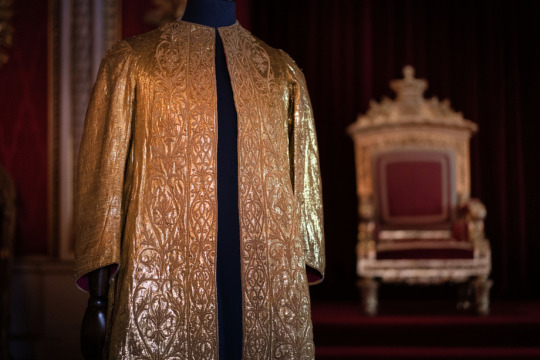
Although this Supertunica dates from the twentieth century, the form of the Supertunica has changed little since medieval coronations. The design of the Supertunica is based on priestly and religious vestments.
Each side of the front of the Supertunica features an embroidered band with spiral threads, which take the shape of leafy stems using the goldwork technique. The embroidery was carried out in 1911 by the Ladies Work Society and, as part of the centuries-old tradition for the Supertunica, is based on ecclesiastical vestments from medieval times.
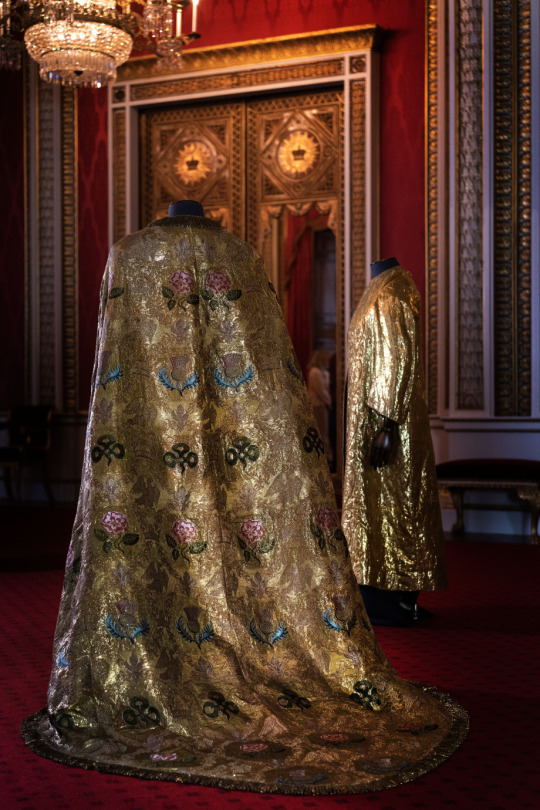
The Imperial Mantle is worn over the Supertunica and is more similar in design to a robe. The Imperial Mantle being used by the King at this year’s Coronation was made for the Coronation of George IV in 1821, and has been worn by King George V, King George VI and Queen Elizabeth II. It is the oldest vestment being used in the Coronation Service.
The Imperial Mantle is made of cloth of gold, gold, silver and silk thread, silk, gold bullion fringe and a gold clasp. The cloth of gold is woven with roses, thistles, shamrocks, crowns, eagles and fleurs-de-lis. The gold clasp is in the shape of an eagle, which can also be seen on the newly created Anointing Screen, and in the form of the Ampulla which will hold the Chrism oil.
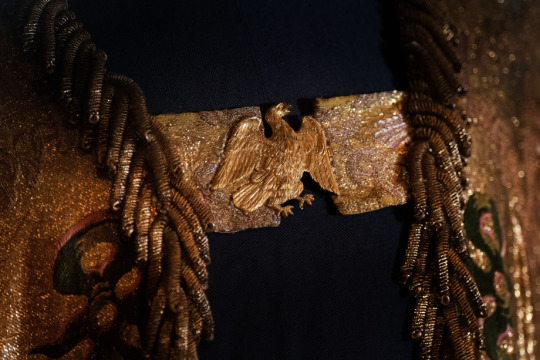
The Imperial Mantle was made by the tailor John Meyer in 1821 and the Royal Goldsmiths to George IV, Rundell, Bridge and Rundell supplied the gold eagle clasp.
The Girdle, also known as the Coronation Sword Belt, is made of cloth of gold, and embroidered in gold thread with arabesques and scrolls. It is lined with dark red silk, with a gold buckle stamped with national emblems (roses, thistles and shamrocks) and a gold clip for attaching the Jewelled Sword of Offering in place.
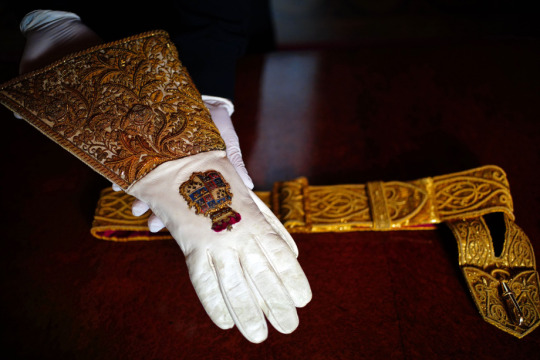
During the Coronation Service, the Sword Belt is placed around the Supertunica. The Jewelled Sword of Offering is then 'girded' or fastened at the Sovereign's waist using the Sword Belt. The Archbishop presents the Sword to the Monarch while saying that it should be used for the protection of good and the punishment of evil. The Sword is then removed and placed on the altar in Westminster Abbey, before the Sovereign is invested with the Imperial Mantle.
Historically the Sword Belt is supplied new by the Worshipful Company of Girdlers for each Coronation. His Majesty has chosen to reuse the Sword Belt made for the Coronation of his grandfather, King George VI, on 12th May 1937.
The Coronation Glove or gauntlet is made for the Sovereign’s right hand. It was presented by the Worshipful Company of Glovers, made by Dents the glovemakers, and embroidered by Edward Stillwell & Company in 1937. This Glove has been conserved by Dents with support from the Worshipful Company of Glovers and re-presented by the Company ahead of the Coronation on 6th May.
The Glove is worn to hold the Sovereign's Sceptre during the Crowning and then removed before processing to the Throne Chair. At the Coronation on 6th May, the Coronation Glove will be presented to His Majesty by Lord Indarjit Singh of Wimbledon.
63 notes
·
View notes
Text
Today I am analyzing Thingol’s death.
Húrin- poor Húrin! - is the one to bring the Nauglamír to Thingol. Originally he gives it to him in scorn, to shame him for his treatment of Húrin's family and for setting the quest for the Silmaril which claimed Finrod's life. Thingol, filled with pity for Húrin, restrains his anger and does not respond. It is Melian who tells Húrin that he is wrong about how Thingol treated his family and he is speaking with the "voice of Morgoth."
So Húrin, under Melian's Girdle, is at last able to understand the entirety of what Morgoth has done to him. He then gives the Nauglamír to Thingol again, this time in sincerity, and in part "as a memorial of Húrin of Dorlómin." He then leaves, probably to take his own life.
I wonder if Morgoth's curse over Húrin contributed to Thingol’s demise soon thereafter.
So Thingol is looking at his new necklace, the greatest treasure of Finrod, and he thinks that it should be remade, and set with the silmaril. FASCINATING. Okay, so, it says that as the years had passed, the silmaril dwelt more and more in Thingol's thoughts and he "became bound to it," and wanted to carry it with him always, even as he slept.
The implications of this!!! I mean, if you want you can interpret it as a natural consequence of owning the only piece of holy Tree-light not being worn by Absolute Evil himself, but I'm not inclined to go that way, are you? I do think that the silmarils are more than just pretty jewels. Whether they actually contain a part of Feanor --
--crackship, Thingol×Feanor, love affair started via silmaril proxy--
--or not, I do think that they have some sort of sentience, or resonance, or something. They are more compelling than any other jewel could be. It seems like their influence grows over time, though I don't think that they are evil or cause good people to do bad things. I think everyone who held a silmaril made their own choices.
That being said, Thingol has a little less culpability in his death than I'd thought (according to this text; of course, the biases of the silm are a different discussion).
Thingol hires dwarves to restore the Nauglamír and set the Silmaril into it
The dwarves were immediately filled with desire for both the necklace made by their forebearers and for feanor's jewel, but they "dissembled their mind" and agreed to Thingol's terms
The work took a long time. Thingol would often go and sit among them while they worked. (I viewed this very favorably at first but then remembered that at this point Thingol is loathe to be parted from the Silmaril!)
When they finish, the greatest work of elves and dwarves has been united, and the Nauglamír reflects the silmaril's brilliance outwards.
Thingol, alone among the dwarves, picks up the completed necklace and starts to put it on.
The dwarves stop him. They "demanded that he yield it up to them," saying that he has no right to it, since the Nauglamír was made for Finrod, who is now dead, and only came into Thingol's possession through Húrin, who they call a thief.
Thingol "perceived their hearts" and knew that they wanted the silmaril and were deriving a pretext to get it. (I'm inclined to agree; if they really thought that they had a greater claim to the Nauglamír, they could have said so at the start. It is no accident that the claim is only made once the silmaril is affixed to it.)
Thingol does not stop to consider that he is alone among these dwarves. There is not a single thought of tact or strategy. His anger comes through and he calls them an "uncouth race" and "stunted people" who have no right to make demands of him, and to get gone from Doriath.
So they kill him there where he stood, and he dies with his eyes fixed on the silmaril.
The dwarves try to flee. Some escape but some are slain by pursuers. The survivors spread their version of the story, which is that those dead were killed by command of the elvenking, who sought to cheat them for their work.
This is, in fact, the version I best remembered. For some reason I had forgotten the rest of it. Thingol's anger and pride are his downfall. I wonder what would have happened had the silmarils gone to the dwarves; a slaughter of one sort or another between them and the feanorians, I suppose, but it wouldn't have been a kinslaying.
Following Thingol's death, Melian undergoes a change. In this time the enchanted river Esgalduin "spoke with a different voice." I can't help but remember Mirkwood's enchanted river. If anyone knows anything about the effects of Esgalduin and how they change at this time, please let me know!
Concluding thoughts: Thingol died the way that he lived... being racist to non-elves. <3 Okay, I'm done being flippant. Tbh it is very sad to me. Both the dwarves and Thingol are afflicted by a lust for the Silmaril. The dwarves try an underhanded trick to get it, and Thingol regresses some character growth in response. Thingol's character arc goes from: "under no circumstances is my daughter marrying a human lol might as well go get a Silmaril bc the likelihood of success in either case is the same" -> ":( :((( shit shit shit oh no oh no you weren't supposed to go DO IT. okay i can see that I fucked up. I'm going to foster this little human boy (Turin) about it and grow past my racism. I'll even keep my cool when his dad comes and hurls untrue accusations and slander at me bc i can see how much he's suffered." -> "how dare you speak to me, an elf, this way? You stunted uncouth less-than dwarf--" [death]
Actually, in that light, Thingol's next step is to adopt a dwarf. Gimli better watch out when he gets to Valinor.
I feel for thingol bc he saw his own flaws, worked to improve, and then backslid in a moment of high temper that turned out to be HIS LAST MOMENT ALIVE. (You could argue that anti human bias isn't the same as anti dwarf bias, but the underlying issue is still his pride.) It's just a shame.
14 notes
·
View notes
Text
India archive reveals extent of ‘colonial loot’ in royal jewellery collection
File from India Office archive details how priceless items were extracted from colony as trophies of conquest
by David Pegg and Manisha Ganguly
Published: 14:00 Thursday, 06 April 2023
Five years ago, Buckingham Palace marked its summer opening with an exhibition celebrating the then Prince Charles’s 70th birthday with a display of his favourite pieces from the royal collection, Britain’s official trove of items connected to the monarchy. “The prince had a very, very strong hand in the selection,” the senior curator said.
Among the sculptures, paintings and other exhibits was a long gold girdle inlaid with 19 large emeralds once used by an Indian maharajah to decorate his horses. It was a curious choice to put into the exhibition in light of the violent means by which it had come into the hands of the royal family.

Emerald girdle of Maharaja Sher Singh, c 1840. Photograph: Royal Collection Trust / © His Majesty King Charles III 2023
As part of its Cost of the crown series, the Guardian has uncovered a remarkable 46-page file in the archives of the India Office, the government department that was responsible for Britain’s rule over the Indian subcontinent. It details an investigation, apparently commissioned by Queen Mary, the grandmother of Elizabeth II, into the imperial origins of her jewels.
The report, from 1912, explains how priceless pieces, including Charles’s emerald belt, were extracted from India as trophies of conquest and later given to Queen Victoria. The items described are now owned by the monarch as property of the British crown.
Plundered stones
To fully understand the context behind the jewels, and their place in India’s history, it was necessary to visit the archives.
A journal records a tour in 1837 of the Punjab area in north India by the society diarist Fanny Eden and her brother George, the governor general of the British Raj at the time. They visited Ranjit Singh, the maharajah in Lahore, who had signed a “treaty of friendship” with the British six years earlier.
The half-blind Singh wore few if any precious stones, Eden wrote in her journal, but his entourage was positively drowning in them. So plentiful were the maharajah’s gems that “he puts his very finest jewels on his horses, and the splendour of their harness and housings surpasses anything you can imagine,” she wrote. Eden later confided in her journal: “If ever we are allowed to plunder this kingdom, I shall go straight to their stables.”
Twelve years later, Singh’s youngest son and heir, Duleep, was forced to sign over the Punjab to the conquering forces of the British East India Company. As part of the conquest, the company did indeed plunder the horses’ emeralds, as well as Singh’s most precious stone, the legendary Koh-i-noor diamond.
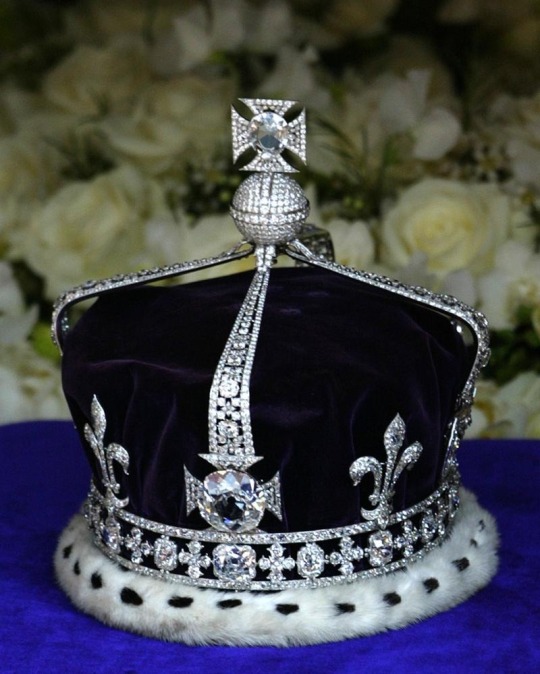
The queen mother’s crown sits on top of the coffin during her funeral in 2002. Photograph: Dan Chung/The Guardian
Today, the Koh-i-noor sits in the crown of Queen Elizabeth the Queen Mother, on display at the Tower of London, and it has become an emblem of Britain’s tortured relationship with its imperial history.
Anita Anand, a journalist and historian who co-wrote a book titled Koh-i-noor on the diamond, said it was “a beautiful and cold reminder of British supremacy during the Raj”, the period between 1858 and 1947 when India was ruled by the crown.
“Its facets reflect the fate of a boy king who was separated from his mother,” Anand said. The stone too was “taken far away from his home, recut and diminished”. Anand said: “That is not how India sees itself today.”
Buckingham Palace is plainly aware of the sensitivities surrounding looted artefacts. After the Indian government let it be known that for Camilla, the Queen Consort, to wear the Koh-i-noor at Charles’s coronation would elicit “painful memories of the colonial past”, the palace announced she would swap it for a less contentious diamond.
But, as was discovered by Queen Mary, the Koh-i-noor was not the only gem taken from Singh’s treasury to have found its way to the British monarchy.
Royal with a pearl necklace
Among the jewels identified in the document found by the Guardian is a “short necklace of four very large spinel rubies”, the largest of which is a 325.5-carat spinel that later came to be identified as the Timur ruby.
Its famous name is erroneous: research by the academic Susan Stronge in 1996 concluded it was probably never owned by Timur, a Mongol conquerer. And it is a spinel, a red stone similar to, but chemically distinct from, a ruby.
Elizabeth II was shown handling it in the 1969 BBC documentary Royal Family, and was clearly acquainted with the myths surrounding it. “The history, of course, is very fascinating. It belonged to so many kings of Persia and Mughal emperors, until Queen Victoria was sent it from India,” she observed.
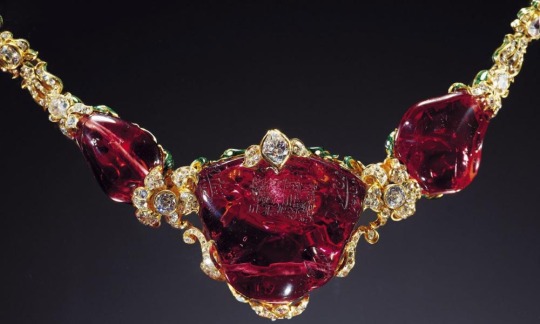
The Timur ruby necklace, 1853. Photograph: Royal Collection Trust / © His Majesty King Charles III 2023
The queen was never pictured wearing the item. However, she may have worn another of the Lahore treasures, identified in the India Office report as “a pearl necklace consisting of 224 large pearls”.
In her 1987 study of royal jewellery, Leslie Field described “one of the Queen Mother’s most impressive two-row pearl necklaces … made from 222 pearls with a clasp of two magnificent rubies surrounded by diamonds that had originally belonged to the ruler of the Punjab” – almost certainly a reference to the same necklace.
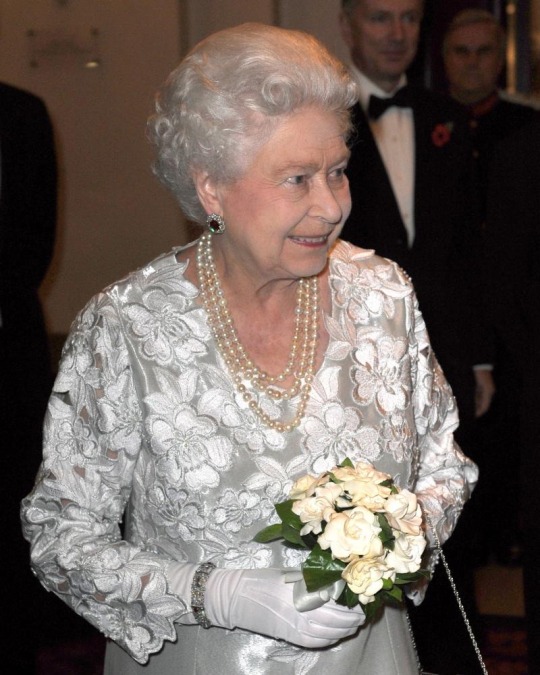
The queen wearing pearls at the Royal Opera House in 2012. Photograph: AFP/Getty Images
In 2012, Elizabeth II attended a gala festival at the Royal Opera House in London to celebrate her diamond jubilee. Photographs showed her wearing a multi-string pearl necklace with a ruby clasp.
Were these Ranjit Singh’s pearls? There was speculation they may have been, though Buckingham Palace was unable to confirm either way.
Queen Mary’s interest appears to have been prompted by curiosity about the origin of some of her pearls rather than any moral concern about the manner in which they were obtained. But a Buckingham Palace spokesperson said slavery and colonialism were matters that “his Majesty takes profoundly seriously”.
Shashi Tharoor, formerly an undersecretary at the United Nations, and currently an MP in India, said: “We have finally entered an era where colonial loot and pillage is being recognised for what it really was, rather than being dressed up as the incidental spoils of some noble ‘civilising mission’.
“As we are seeing increasingly, the return of stolen property is always a good thing. Generations to come will wonder why it took civilised nations so long to do the right thing.”
#abolish the monarchy#queen elizabeth ll#king charles the cruel#brf#colonialism#koh i noor#cost of the crown#the guardian#british royal family#imperialism
74 notes
·
View notes
Text
the fairest stars
What if Angrist was a little tougher, and Beren and Lúthien managed to steal two Silmarils from Morgoth instead of one? Somehow I’ve already written NINE parts of this unhinged bullet point AU here and decided it was time for a fresh post to avoid that one getting too long.
Where we left off: Lúthien has been negotiating with Mandos like a pro, Maglor is nearly-but-not-quite-dead in Menegroth, Thingol has taken one Silmaril from him, Fingon has the other Silmaril and ditched Curufin outside the Girdle even though they did some bonding on the Worst Road Trip, and people are still upset about Celegorm’s death. YES I am well aware that the pipeline from the fairly normal first sentence of the post to this mess is insane.
Fingon and Maedhros are both very, very good tacticians. Between them, it isn’t very difficult for Fingon to follow Maedhros’ directions towards Menegroth, and then to find the hidden pathways by which Huan led Maedhros out of Thingol’s halls.
It helps that Thingol is still under the impression that the Girdle is impenetrable with the aid of his Silmaril, so he doesn’t have anyone keeping an eye out for the High King of the Noldor sneaking into his realm on an Adventure.
Finding Maglor's sickroom/prison cell/whatever is a little trickier, but not impossible. Long ago in Tirion Fingon was a mischievous child, so he's well aware that the best way not to get caught sneaking into a forbidden place is to make it perfectly clear that you belong there.
He strides confidently down the corridors, silently reciting Maedhros' directions to himself. Nobody stops him.
He's hoping that Curufin was wrong, and he'll know Maglor's door by the holy light showing through the cracks; but when none is evident he's forced to take his chances and start trying doors in the area Maedhros indicated at random.
Since he has plot armour is very lucky with this whole improbable-rescue thing he comes across Maglor without any trouble.
Maglor is only half-conscious – quite apart from the wounded leg, he hasn’t eaten in days – but his eyes flicker open when Fingon comes in.
“Hello, Makalaurë,” Fingon says, deliberately cheerful. “I’ve come to take you home.”
“You can’t do that,” Maglor says dazedly. “It burned – in the Bragollach – remember?”
Fingon opts not to answer that. “Russo said you were healing when he left,” he says instead, frowning at the bloodstained bandages around Maglor’s leg. “What happened? Has Thingol been mistreating you? I thought Lúthien at least was kind!”
Maybe he was too hasty in leaving Curufin outside the Girdle.
Maglor hurries to explain that Lúthien is dead, and that he’s actually in this pathetic state by choice or something.
“Right,” says Fingon, “well, you’re coming back to Himring now.”
But Maglor shakes his head. “I can’t, Finno,” he says. “Thingol took the Silmaril from me. I don’t – I’ve been trying to hold it back. The Oath. But I can’t leave it in Doriath and go, I can’t. So you’ll have to leave me behind.” He manages a brave and tragic smile.
On Thangorodrim while Fingon was struggling futilely with Morgoth’s iron shackle, hopeless tears running down his face, Maedhros said, You’ll never be able to free me, Finno, just kill me, please—
Fingon is rather sick of Fëanorian melodrama.
“One step ahead of you,” he says brightly, and he produces Maedhros’ Silmaril from its box, handing it to Maglor before his Oath can stir at the sight of it. “Here it is.”
This would never normally work. But Maglor is very tired and ill, and not thinking as clearly as he otherwise would.
As long as the obvious question doesn’t occur to him until they get outside the Girdle again—
Maglor takes the jewel and gives a relieved little sigh as the bite of the Oath eases. “You really took it from Thingol?”
“Of course,” Fingon lies. “Let’s put it back in the box for now so that it doesn’t attract too much attention?”
Maglor acquiesces. He and Fingon aren’t close exactly, but they get on well – certainly far better than Fingon does with Curufin. There’s an odd shared camaraderie that comes from loving Maedhros; it lends itself well to cooperation in difficult circumstances.
Fingon picks Maglor up – he's alarmingly light – and they begin to make their way back out of Menegroth.
"You're to be my betrothal gift," Fingon tells Maglor, and Maglor actually laughs.
Unfortunately it's much harder to look innocuous when you're carrying someone about five minutes away from expiring on the spot.
They haven't got very far before an angry voice comes from behind them: "Who are you and where are you going with the Fëanorion?"
Damn.
Meanwhile
[I should clarify my definition of "meanwhile" here. Evidently time runs much slower in Aman than it does in Middle-earth, even post-Darkening, or it's difficult to fathom why Beren and Lúthien canonically took two years to return from death. In vague support of this, the Fellowship find that time runs slowly in Lothlórien, presumably with the aid of Galadriel's ring, so I posit that the more Divine Stuff there is near a place (and Galadriel was ofc a student of Melian too), the more weird time shit occurs. So since I've anyway fudged the timelines so that travel times work out conveniently, we can also put the bits of story occurring in Aman here for funsies.]
Meanwhile, Finrod has been following Celegorm around in the Halls of Mandos.
"Was it worth it?" he asks. "Did you take joy in the lordship of Nargothrond, once I was gone?"
"I could ask you the same," says Celegorm, responding for the first time. "Did you die for anything in the end, Ingoldo? The mortal's here, after all your efforts. So much for your oath."
"So much for yours," says Finrod; "it looks like that eternal darkness you doomed yourself to wasn't that dark. Or eternal. So what was it all for? Do you even regret any of it?"
The dead can't lie. Artifice and deception are matters of the flesh, and they are buried with it.
"I didn't want you to die," Celegorm says.
"Well, that's a start!" says Finrod. "I can't say I'm glad to see you here, either."
"O Fair and Faithful one," says Celegorm, "spare me none of your pity. They are already whispering that you will be released soon, first of all the Exiles to walk again in Aman. So it's all turned out rather well for you, despite your evil cousins' machinations."
"I suppose it has," says Finrod, thinking.
The thing is, it was worth it. Beren's life mattered. It mattered that he saved it, even if he died to do so, even if Beren is dead now too (although word is that might be changing).
He did not do it expecting a reward.
"And my werewolf was bigger than yours," says Celegorm.
Finrod rolls his metaphorical eyes. "At least I actually killed mine."
Cousinly bickering is still kind of fun, even when you're dead.
Curufin, fuming outside the Girdle, would not agree.
After a time he's forced to conclude that the only thing he can do is head back to Himring.
The ride through Himlad, once as green and fair a land as any, does not improve his mood.
Also his burned hand is still hurting.
Look: here's the little stream where Celegorm caught a huge fish once; and here are the low hills where, a couple of centuries ago, they held some war games and Curufin's people thrashed Celegorm's decisively.
Here's the copse where, years before the Dagor Aglareb brought tentative peace to East Beleriand, Curufin and his son were surprised by a party of orcs, who took their small patrol all captive.
Tyelpë was just barely of age at the time. How trusting his eyes, then, how baby-soft his hair: how easily he had believed that his father would fix everything.
As for Curufin, he spent the hours-long ordeal learning anew what terror was, rendered compliant by the mere possibility that they could hurt his child.
They were fine, in the end. Celegorm rode up to the rescue while the orcs were still quarrelling over where to take them.
But Curufin remembers: how disabling love can be.
Meanwhile Fingon finds himself surrounded by a crowd of angry Iathrim in their home city.
He sets Maglor down on the floor and sets a hand on his sword-hilt, wondering if he is about to become a Kinslayer again.
(Fingon regrets Alqualondë more than anything; and he'd do it again, for Maedhros' sake. He knows this about himself.)
Before things escalate too far, Thingol shows up at the scene of the disturbance.
"We haven't met," Fingon says. "Fingon son of Fingolfin, High King of the Noldor in Beleriand. I've come for my cousin." He gives Thingol a rather dangerous smile.
Thingol thinks he might be in serious trouble. He attempts to adopt a conciliatory tone (which is really really hard for Thingol ok he's trying).
"He'll die if he's moved," he says, nodding to where Maglor is slumped against the wall, shivering.
"He'll die if he stays here!" Fingon says. "Is this the famed hospitality of your halls?"
"He has been offered every treatment he could ask for," Thingol says. "It is not the fault of Menegroth if he chooses to refuse them. Now tell me, son of Fingolfin, how came you through the Girdle of Melian – without her leave or mine?"
Maglor puts the pieces together. "Finno, you lied to me," he breathes, glancing at the box in Fingon's hand.
Fingon wonders if it would be diplomatically insensitive to kick Thingol.
"The jewel alone does not explain it," Thingol insists. "While I hold the Silmaril my daughter won, surely—?"
"I could have told you that, had you asked," says Maglor. "Silmarils aren't weapons! You can't use one as some sort of military defence."
Thingol is now questioning all his life choices.
He only took the Silmaril from Maglor in the first place because he thought it would protect his kingdom, and now—
Maglor is feeling resigned. He should have known Fingon's claim was too good to be true. Thingol still has the Silmaril, and Maglor can't leave Menegroth without it.
Face pale and set, he attempts to get to his feet, mostly unsuccessfully.
Fingon looks down at him. "Seriously, Makalaurë?" And when Maglor ignores him, he says, "Sorry about this," and kicks Maglor's bad leg – carefully, but still hard enough to hurt.
Maglor faints.
Fingon picks his limp body up. "The Silmaril isn't yours," he tells Thingol.
"The white ships of Olwë my brother's people were not yours, either," Thingol returns.
Fingon inclines his head, acknowledging the point. "I don't wish to start a war over the Silmaril," he says. Maglor is so cold and still in his arms. "My cousins have done enough for that cause lately. Only let me take my kinsman home."
Thingol hesitates. The iron box in Fingon's hand is so close, and Fingon is outnumbered, and he has his injured cousin to worry about—
It could all be over, if he took the second Silmaril. He'd never need to worry about his people's safety from invasion again.
"Elu," comes a voice from behind him, "enough of this. Let them go."
"Queen Melian," says Fingon, bowing his head.
She barely looks at him, meeting her husband's gaze instead. "Time and again you have disregarded me," she says. "Lúthien is lost, and yet you persist with this. Will you heed me now?"
Thingol stares at her, and then, finally, he waves his hand. The bristling guards move aside, allowing Fingon free passage down the corridor.
"I trust you can remember your way out," Thingol tells Fingon, and turns away.
Fingon looks at Melian. "Thank you," he says, "and I am very sorry about your daughter."
He has met Maiar before, of course, in Valinor: but Melian is still unsettling, with her implausibly flawless face and eyes that hold yet the memory of a time before Time.
"Little king," she says, "only hope that you will not know any such pain yourself."
Fingon manages a smile. "I'm good at that," he says. "Hope."
On that note he leaves Menegroth, carrying Maglor, and begins to make the long trek back through the Forest of Region, and thence to Himring.
Curufin has managed the journey significantly more quickly. On a crisp cold morning he rides back through Himring's gates.
Maedhros has been... managing. Not well, but he trusts Fingon.
Beloved, I will bring them back to you. Beloved, I will bring them back to you. Beloved, I will bring them back to you.
But here's Curufin by himself, looking pale and tired, and after all it was only a hastily-scribbled note, not an incantation.
Maedhros arrives at the gate at a run.
Scarce weeks ago it was the other way around, Maedhros riding into the fortress with Fingon's cloak only just concealing his bloodstained clothes: and Curufin met him as he came in and he can still feel the terrible jolt of knowledge in his stomach, and Celegorm is still dead.
How can it be borne?
A thought comes to Curufin and for a moment he thinks it the cruellest idea he has ever had, but Celegorm is dead and his hand is still burned and nobody expects any better of him anyway.
"They're dead," he says flatly, "they're both dead," and Maedhros just – stares at him.
(to be continued)
#silmarillion#my fic#bullet point fic#the fairest stars#fingon#maglor#finrod#celegorm#thingol#curufin#maedhros#theme of the day: lying#thingol makes one (1) good decision!#curufin makes zero (0)!#maedhros has a really bad day!#what else do we expect from this au
343 notes
·
View notes